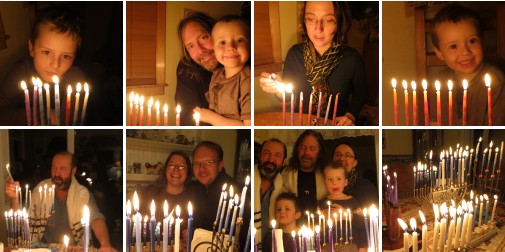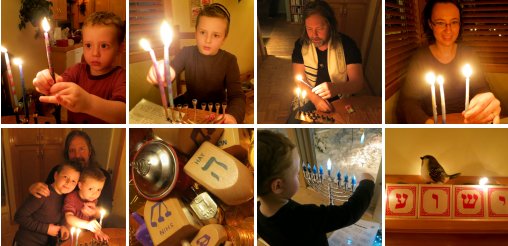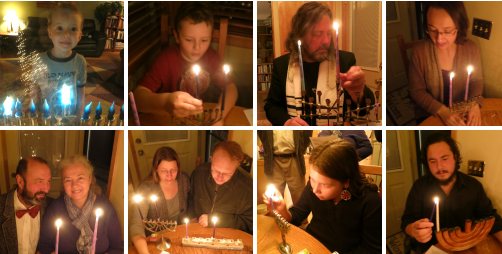|
Jewish Holiday Calendar
Note: For December 2012 updates, please scroll past this entry....
The winter holidays remember special times of victory when God acted on behalf of His people so that they would triumph over their enemies. Note that in accordance with Jewish tradition, all holiday dates begin at sundown:
The Winter Holidays:

- Month of Kislev (begins Wed. Nov 14th)
- Month of Tevet (begins Thur. Dec. 13th)
- Month of Shevat (begins Fri. Jan. 13th, 2013)
- Month of Adar (begins Sat. Feb 9th)
December 2012 Updates
The Mirror of Hearts...
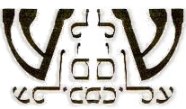
12.31.12 (Tevet 18, 5773) The Holy One, blessed be He, mirrors the heart; and as you are with God, so is God with you (Psalm 118:25-26). Yet God is our Helper, and as we draw near to Him, he draws near to us. Therefore may it please the Lord to renew our hearts so we may walk with Him in sincere love. May we forsake persecuting ourselves and instead be tolerant of our shortcomings, befriending our own souls. אִם אֵין אֲנִי לִי, מִי לִי - "If I am not for myself, then who will be for me?" (Mishnah: Pirkei Avot 1:14). May we learn to regard ourselves kindly, despite our missteps and sins, and deeply rely on God to transform our inner life for good (1 Cor. 15:49). Salvation is God's great work being done within us, and may we reflect back the glory of God's love from hearts of genuine faith. As it is written, Adonai li, lo ira (יְהוָה לִי לא אִירָא) "God is with me; I do not fear" (Psalm 118:6).
עִם־חָסִיד תִּתְחַסָּד
עִם־גְּבַר תָּמִים תִּתַּמָּם
עִם־נָבָר תִּתְבָּרָר
וְעִם־עִקֵּשׁ תִּתְפַּתָּל
im · cha·sid · tit·chas·sad
im · ge·var · ta·mim · tit·ta·mam
im · na·var · tit·ba·rar
ve·im · i·kesh · tit·pa·tal

"With the merciful you show yourself as merciful;
with the blameless man you show yourself as blameless;
with the pure you show yourself as pure;
but with the crooked you show yourself torturous"
(Psalm 18:25-26)

God reveals to us as we are to others (including ourselves); He mirrors our heart back to us. In Proverbs it is written: "As a man thinks in his heart, so is he," just as Yeshua said, "According to your faith be it done unto you." Note that each term in this passage (chasid, tamim, etc.) is matched (or answered) with the hitpael (intensive reflexive) verb form. For example, with the chasid (i.e., the merciful, the kindhearted) God shows Himself as compassionate and sympathetic (Matt. 5:7); with the tamim (blameless, mature), He shows Himself as perfect and right; with the pure in heart, He reveals Himself as spotless and holy (Matt. 5:8) –- but with the twisted (or perverse), He reveals Himself as contrary and even stubborn (the verb means to twist, spin, or even to wrestle in opposition).
The divine reciprocity is always "like-for-like." God reveals Himself with the same character and in the same "mode" that we show to others; God relates to us as we relate to others: middah keneged middah (Luke 6:38). In this way, the LORD "amplifies" by redoubling our relationships, which thereby mirrors the nature our character to ourselves. This is perhaps why we sometimes "replay" the same mistakes in our lives. God keeps us wandering in the desert to help us confront who we are inside, who we really are, which then may awaken within us the desire for teshuvah... The LORD "renders to men according to their deeds" – not in a vindictive way, of course, but to help us understand the nature of our actions and to help us turn back to Him. Are you in need of mercy? Then be merciful to others... Do you want to experience more of God's love? Then show love to others... Are you in need of forgiveness? Then forgive others and regard them with honor and esteem. As you do unto others, so will be done unto you.
We see then how important it is to think good and positive thoughts (Phil. 4:8) and to always try to use the "good eye" to see the best in others (Matt. 6:22). King David understood the principle of reciprocity when he said, "let what I prayed for others return to my own bosom" (תְּפִלָּתִי עַל־חֵיקִי תָשׁוּב), and since our thoughts are prayers, we need to be especially careful to think the best, to extend kaf zechut (the hand of merit) to everyone we meet... You are quick to make excuses for your own misdeeds; so make excuses also for your neighbor. God will take care of the outcomes, we need only focus on Him and obey.
Postscript: The idea that God "mirrors" our hearts back to us isn't the principle of "karma" as much as it is the means of sanctification... Sanctification then is a spiral upwards, if you will, and hardships and testing may be the means of refining the heart to bear suffering, to become more patient, to become more compassionate, etc. Such refining enables our hearts to better mirror the glory of the LORD to others.
 |
The Hungry Heart...

12.31.12 (Tevet 18, 5773) The hungry heart that seeks God will find Him within the heart itself, because the heart is the place where we become aware and alive to the Divine Presence. As Yeshua said, "The kingdom of heaven is found within you" (Luke 17:21); it is a matter of the heart, of choosing to have emunah (faith), rather than seeing with the eyes. We believe to see, not the other way around! What a great gift it is to truly desire God -- to hunger and thirst for Him above all else... Ask the LORD to fill you with His Spirit to reveal the expanse of your heart's need for Him, and to establish His glorious reign within you...
Omnipresent Wonder...
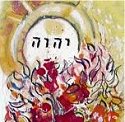
[ The following entry is related to this week's Torah reading (Parashat Shemot). Please read the Torah portion to "find your place" here. ]
12.31.12 (Tevet 18, 5773) Why did God choose to reveal himself to Moses in the midst of a thornbush (הַסְּנֶה)? To teach us that there is no place devoid of the Divine Radiance, not even the lowly thornbush. Indeed the midrash asks, 'Where is God?' and then cites where Torah says, 'I will stand before you there' (Exod. 17:6), which is to say, in every place where you find a trace of footsteps, there I AM. As Elizabeth Browning wrote, "Earth is crammed with heaven; and every bush afire with God; but only he who sees takes off his shoes." May the LORD open our eyes and help us not be sightless among His miracles...
The Troubles of Love...

[ The following entry is related to this week's Torah reading (Parashat Shemot). Please read the Torah portion to "find your place" here. ]
12.31.12 (Tevet 18, 5773) People tend to believe what they want to believe until they are faced with reality, and therefore God orchestrates tests and challenges to awaken people from their illusions to make them confront their need for deliverance. Such afflictions are called yissurim shel ahavah, "troubles of love." Thus we read in our Torah portion this week how the people groaned because of their slavery and then cried out to heaven for help: "And God heard their groaning; he remembered his covenant ... and God saw the people of Israel, and God knew" (Exod. 2:24-25). Note the pattern: The people cried out for help; God heard (וַיִּשְׁמַע); he remembered (וַיִּזְכּר), he saw (וַיַּרְא); and he knew (וַיֵּדַע)... God knows our profound need for Him. Affliction teaches us that wishful thinking is unable to sustain the weight of reality, and only God Himself can truly save us...
Where it says, "How long shall I take counsel in my soul, having sorrow in my heart daily" (Psalm 13:2), the sages remark that just as long as we take counsel in our own soul there will be despair, since only after we realize that no further counsel can help us do we give up and confess our need for God's salvation. Therefore בְּטַח אֶל־יְהוָה בְּכָל־לִבֶּךָ, "trust in the LORD with all your heart, and do not lean on your own understanding" (Prov. 3:5).
 |
Calendars and Assumptions...
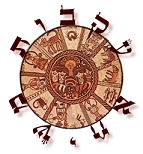
[ Does God really have a calendar? Did He really establish seasons and months of the year to disclose His prophetic plans to mankind? If so, then what relationship is there between the world's calendar systems and the calendar system outlined in the Scriptures? ]
12.30.12 (Tevet 17, 5773) Often we don't realize what is not being said because of what is being said. In other words, hidden or unspoken assumptions are always at work in communication, though we rarely take the time to seriously examine these assumptions for ourselves. Advertisers, politicians, and others who wish to control your thinking implicitly understand this and therefore regularly employ various techniques to distract you from examining their assumptions. They understand that the louder (or more frequently or more threateningly) something is said, the less likely you will question its truth status or engage in reasonable thinking of your own.... In other words, "truth" for such pragmatists is little more than persuasion. Get the crowd to believe you and you've got the "truth."
Take, for example, the idea that people should all rush about purchasing Christmas presents to give on December 25th, or that we are now about to begin a "New Year." All around the world people are getting ready to celebrate a transitional day that marks the end of one year and the beginning of the next. In various countries of the world, New Year's Day is usually celebrated on January 1st, though this date comes from the arbitrary decree of the consuls of ancient (and pagan) Rome -- not from anything taught in the Hebrew Scriptures. Indeed, some Christian churches plan their own New Year's celebrations, offering a service to make resolutions and to offer up special prayers. (Because it falls eight days after December 25th, some Roman-influenced churches observe this date as the "Feast of Christ's Circumcision.") Many mainline churches plan "midnight" communion services so that the sacraments could be taken just before the start of the "new year." Now while all this might be encouraging and helpful in some ways, it needs to be stressed that the civil New Year that the world celebrates is not a Biblical holiday at all, and in fact is opposed to the Biblical Calendar that was revealed in the Torah and Scriptures.
The Torah designates the month of Nisan (Scripturally called aviv, or "spring") as the first month of the year (Exod. 12:2). Originally, then, the Hebrew calendar was lunar and observational. When the new moon was sighted, a new month begun. Since the Torah also identified Sukkot as "the end of the (harvest) year" (Exod. 23:16), the sages of the Mishnah later identified the Fall month of Tishri (i.e., the "seventh month") as the start of a new year.
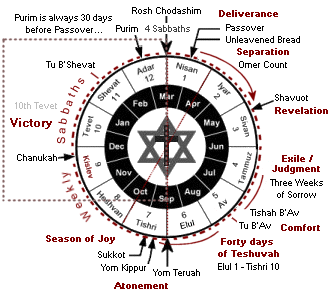 |
So the Torah reveals that there are two mirroring "New Years" observed during the year. The first occurs two weeks before Passover (Nisan 1) and the second occurs ten days before Yom Kippur (Tishri 1). The first is called Rosh Chodashim (see Exod. 12:2), which commemorates the month of the redemption of the Jewish people (i.e., and the first advent of Yeshua as the Lamb of God), whereas the second is called Yom Teru'ah that is associated with the "Feast of Ingathering" at the "end of the year" (Exod. 23:16, 34:22), which commemorates God's judgment and atonement (i.e., the second advent of Yeshua our LORD). Later Yom Terua'h became known as Rosh Hashanah ("the head of the year") which began a ten-day "trial" of humanity climaxing on the Day of Atonement (Yom Kippur).
Note: While we don't worship the Torah's calendar, we must be careful not to divide what need not be divided... We are to "rightly divide" (ὀρθοτομέω, lit. "cut straight") the word of truth, which means understanding where the lines are to be drawn before any cut is made (2 Tim. 2:15). The Torah's calendar and its festivals are "appointed times" (מוֹעֲדִים) that prophetically reveal God's truth and provide the framework (context) for understanding the identity and work of the Yeshua for the salvation of the world. We don't divide between so-called "Jewish and Christian" calendars, but understand that it is the root that supports the branches, and not the other way around (Rom. 11:18). For a bit more on this subject, see the page, "The Gregorian Calendar and Pagan Assumptions."
 |
Parashat Shemot...

[ Happy Holidays, friends. The following entry provides a brief overview of this week's Torah reading (Shemot). Please read the Torah portion to "find your place" here. ]
12.30.12 (Tevet 17, 5773) Our Torah reading for this week is the very first of the Book of Exodus, called parashat Shemot (שְׁמוֹת). This portion begins directly where the Book of Genesis left off, namely by listing the "names" (shemot) of the descendants of Jacob who came to Egypt to live in the land of Goshen. Over time Jacob's family flourished and multiplied so greatly that the new king of Egypt – who did not "remember" Joseph - regarded them as a threat and decided to enslave them. When the king's oppression did not curb their growth, however, he cruelly commanded the Hebrew midwives to kill all newborn Jewish boys. When the midwives refused to obey, however, the Pharaoh commanded that all newborn boys were to be drowned in the Nile river (the Hebrew word for Egypt, Mitzrayim (מִצְרַיִם), can be rearranged to form the phrase tzar mayim (צַר מַיִם), meaning "torture through water," which was the plan of the nefarious Pharaoh).
During this time of grave oppression, a family from the tribe of Levi bore a son and hid him for three months. When the baby could no longer be concealed, however, his mother Yocheved (יוֹכֶבֶד) set him afloat in the Nile River inside a basket, praying that he might somehow escape death. Miriam (מִרְיָם), the baby's sister, watched what would happen, and soon the basket was discovered by the daughter of Pharaoh, who decided to save the baby and adopt him as her own son. Miriam then cleverly offered to have her mother become the baby's wet-nurse for the princess. After the child was weaned, he was brought to Pharaoh's palace to live as the princess' son. The princess named him "Moses" (משֶׁה), meaning "drawn out" (מָשָׁה) of the water.
Later, when Moses was a full-grown man, he "went out to his people and looked on their burdens." When he saw an Egyptian beating an Israelite slave, he killed the Egyptian and hid his body in the sand. The following day he tried to reconcile two Israelites who were fighting, but the one in the wrong prophetically objected: "And who made you a prince and judge over us? Do you want to kill me as you killed the Egyptian yesterday?" Upon hearing this Moses decided to flee from Egypt to Midian. There he rescued Zipporah (צִפּרָה), the daughter of Jethro (יִתְרוֹ), a Midianite priest. Soon afterward, Moses decided to work for Jethro and married Zipporah. They had a son named Gershom (גֵּרְשׁם).
After nearly 40 years living in Midian as a shepherd, God called out to Moses from the midst of a burning bush to commission him to lead the Israelites out of Egypt back to the Promised Land. When Moses protested that he was inadequate for this task, God gave him three "signs" to authenticate his message. God also appointed his brother Aaron to be his spokesperson. Moses and Aaron then went to the Pharaoh and demanded that the Israelites be permitted to leave Egypt to worship the LORD in the wilderness. The Pharaoh, however, dismissed Moses and his God, and increased the workload of the slaves by forcing them to make bricks without straw.
As the Israelites suffered even more, Moses despaired over his mission and asked the LORD why he sent him to Pharaoh in the first place: "For since I came to Pharaoh to speak in your Name, he has done evil to this people, and you have not delivered your people at all." But the LORD replied to Moses, "Now you shall see what I will do to Pharaoh; for he shall let the people go because of a greater might; indeed, because of a greater might he shall drive them from his land."
Note: You can download the free Shabbat Table Talk for this Torah portion here:
The Book of Exodus...

12.30.12 (Tevet 17, 5773) Over the next ten weeks (until the middle of March) we will be reading and studying the Book of Exodus and considering its message in light of revelation of Yeshua our Messiah.... There are forty chapters in this book (16,723 words, 63,529 letters) that are traditionally divided into eleven weekly Torah readings.
Some of the greatest narratives of all the Scriptures are found in this book, including the Israelites' enslavement and subsequent deliverance with the ten plagues by the hand of the LORD. After the very first Passover, Moses led the people out of the land Egypt, crossing the Sea of Reeds, and arriving at Sinai to receive the Torah exactly 49 day later.... While Moses was on the mountain, however, the people worshipped a Golden Calf, and a long period of repentance occurred until the covenant was reestablished. The remainder of the book describes the details and construction of the Mishkan (Tabernacle).
In English the word "Exodus" ("going out") comes from the title of the ancient Greek translation of the phrase Sefer Yetziat Mitzraim ("the book of the going out from Egypt"). Hence the Greek word ἔξοδος became "Exodus" in Latin which later was adopted into English. In the Hebrew Bible this book is called Shemot ("names"), following the custom of naming a book according to its first significant word.
 |
The Power to Change...

12.28.12 (Tevet 15, 5773) True spirituality humbly trusts in God's power to change the heart, and never in the power of "magic." Magic willfully attempts to control God (or other things) through some kind of technique: a special formula, a shibboleth, a ritual, a custom, or through rule-following behaviors. Magical thinking is common to all religions that believe that they can influence spirits through their own merits or ritual actions. Trusting in the miraculous power of God, however, is precisely the opposite of such magical thinking. It acknowledges that we are not in control, that we cannot manage our own lives, and that we must completely let go in trust... The miracle of inner transformation occurs when we accept God's love and power alone as our remedy, and renounce our magical thinking. The voice of God's grace begins with the message: "Don't change; I love you just the way you are, though I will reveal that love to you through inner transformation."
I was neurotic for years. I was anxious and depressed and selfish. Everyone kept telling me to change. I resented them, and I agreed with them, and I wanted to change, but simply couldn't, no matter how hard I tried. What hurt the most was that, like the others, my best friend kept insisting that I change. So I felt powerless and trapped. Then one day another friend said to me, "Don't change! Never change! I love you just as you are." Those words were music to my ears: "Don't change, never change -- I love you just as you are." I relaxed; I came alive -- and suddenly I changed! (Anthony de Mello: The Song of the Bird, 1982)
This is why Yeshua explained that we must be "born again" (John 3:3). There is nothing of the old life that can bring about new creation... This is as mysterious as the movement of the winds (John 3:8). It would be comical were it not so tragic that religious people think they can somehow manipulate God into accepting them based on their own demands, their own "script," their own religion.... The message of grace is that everything has been done for you, and the only thing you need to do is "show up," to have faith, and to accept your place at the table. Human pride always stumbles over the idea of unconditional love.
The Seedbed of Creation...
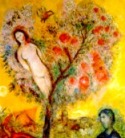
[ Since we are finishing the Book of Genesis (Bereshit) this Shabbat, I thought it would be worthwhile to review its foundational significance in light of the rest of the Scriptures... ]
12.28.12 (Tevet 15, 5773) The Book of Genesis (בְּרֵאשִׁית) is truly the "beginning," the "root," and the "seedbed" of all the subsequent Scriptures - including the message of the gospel and the revelation of the New Testament. In Genesis we see the creation and ruin of man through sin, but we take hold of the promise of deliverance through the coming Seed of the woman; in the Book of Exodus (שְׁמוֹת) we see God's powerful redemption secured through the blood of the Lamb; in the Book of Leviticus (וַיִּקְרָא) we encounter communion and atonement in the holy sanctuary; in the Book of Numbers (בַּמִדְבַּר) we experience the leading of God through desert places, and in the Book of Deuteronomy (הַדְּבָרִים) we are renewed by God's faithfulness before we take hold of our inheritance. Ultimately, the concluding book of the Bible, the Book of Revelation, serves as a climactic "final chapter" of the story begun in Genesis, where the Tree of Life (עֵץ הַחַיִּים) is restored to the midst of the paradise of God, and the presence of sin and death have been forever eradicated.
Note: For more on this important topic, see "Seedbed of Creation."
 |
Table Talk for Vayechi...
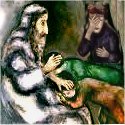
12.28.12 (Tevet 15, 5773) This Shabbat we finish reading the Book of Genesis for the current Jewish year... The book begins with an account of the creation of the universe by the LORD and ends with Joseph being put into a coffin in Egypt. Note that the word translated "coffin" is the Hebrew word aron (אֲרוֹן), a word used elsewhere in the Torah to refer exclusively to the Ark of the Covenant. Throughout their desert wanderings after the Sinai revelation, the Israelites actually carried two special arks - one holding the bones of Joseph and the other holding the Ten Commandments.
To help you review and discuss the final Torah portion of the Book of Genesis, I wrote a Shabbat "Table Talk" for Parashat Vayechi. Like others you can find on this site, first I include a brief summary of the reading followed by a set of questions and answers. Hopefully this material will prompt some interesting discussion for your Sabbath. You can download the PDF file from the linked page (above) or by directly clicking here:
The exclamatory phrase, Chazak Chazak Venitchazek! (חָזַק חָזַק וְנִתְחַזֵּק) means "Be strong! Be strong! And may we be strengthened," which is customarily said after completing a book of Torah. Happy Holidays and Shabbat Shalom, dear friends! May the LORD's love and Presence compass you about, leading you, following you, and helping sustain you in every way! May you be full of the strength and endurance in our precious Lord Yeshua... And thank you all for standing with this ministry. - John
Hiding and Seeking...
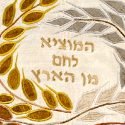
12.27.12 (Tevet 14, 5773) The Hebrew phrase hester panim (הֶסְתֵר פָּנִים) means "hiding of face," and is often used when discussing the hidden-yet-revealed role of God in the Book of Esther. The sages note that there are two types of divine "hiding." The first is such that the person is unaware even that God is hiding, whereas the second type understands that God is hiding, openly, if you will, and that this partial disclosure constitutes an invitation to seek for Him (i.e., it ceases to be hiding if you know it is hiding). To find God, we must seek His face, but this means coming out of hiding ourselves - moving beyond our shame - to believe that God's love and Presence is "for us," even in the darkness. "We find what we are seeking only by understanding that we are being sought."
Therefore dirshuni yichyu: "Seek God and live!" (Amos 5:4). God gives us daily bread so that we return to Him over and over in our need. God wants us to depend on Him, to keep asking, seeking, knocking.... Storing up manna leads to rottenness because faith is always a present concern. God's truth is not a static thing (like a noun), but rather is alive, purposive, and full of action (like a verb). We keep trusting; we keep walking; we are pressing on, etc. Therefore Yeshua says, "Follow me; take my yoke upon you, and you will learn." "The wind blows where it wishes, and you hear its sound, but you do not know where it comes from or where it goes; so it is everyone who is born of the Spirit" (John 3:8).
 |
Through the Wound...
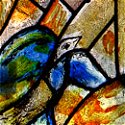
12.27.12 (Tevet 14, 5773) "Find God or die" is a slogan for those who are desperate for deliverance. Many of us have felt abandoned by God at some time, perhaps because of a tragic event that happened when we were vulnerable or unable to defend ourselves. A sense of being abandoned can be terribly wounding, especially if we blame ourselves for the trauma. The painful message implied in any kind of abandonment is, "You are not important; you are not of value." Because of this, we may endlessly search for approval from others, even supposing that God's love is conditional... Part of the healing process is to discover that God comes "through the wound." Despite the pain of our past, we come to trust that all of our life is redeemed, not only that which we can accept, but also that which we can do nothing but agonize and protest. "You shall not die, but live, and declare the works of the Lord" (Psalm 118:17). God will wipe away your tears, friend...
Anger's Curse and Blessing...
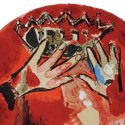
[ Happy Holidays, chaverim... Our Torah reading for this week is Parashat Vayechi, the last portion from the Book of Genesis, which includes Jacob's blessing of his sons... ]
12.27.12 (Tevet 14, 5773) In our Torah portion for this week (Vayechi), Jacob cursed the anger of Simeon and Levi because it was az (עָז) - "intense" (Gen. 49:7). Undoubtedly Jacob recalled their revenge upon the inhabitants of Shechem for the abuse of Dinah, but such intense anger, or rage, is regarded as a type of idolatry because it overwhelms the soul and "drives away" the Divine Presence (James 1:20). Therefore Jacob said "let my soul come not into their council; O my glory, be not joined to their company," and then prophesied that God would divide and scatter them throughout Israel. Yet despite this prophecy, God singularly chose the Levites to draw close to Him to serve as Israel's priestly class. The sages explain that anger, if not az or intense, imparts a sense of mission, determination, loyalty, and steadfast passion, and therefore it can be sanctified for real good. The proper use of anger may help a person survive in the face of grave adversity. Anger gives focus and strength to the soul, though it must be entirely yielded to God in the heart of worship (Psalm 4:4).
 |
Shema of Holy Listening...

12.27.12 (Tevet 14, 5773) The great commandment is always Shema, "listen," because sincere listening requires that we surrender our self-centered perspective and immerse ourselves within the meaning and concern of another.... Listening opens us to God's heart in all things, and therefore is essential for the "conversation" between your soul and the LORD. The process of listening is part of shared love, and that's why we feel lonely when we have no one willing to hear our story, our words. So many people are quick to speak but precious few sacrifice themselves through selfless listening. The spiritual life, however, ultimately is about shared life: We can do together what we cannot do individually. Yeshua prayed that we would know how we need one another. The first step is Shema.
I should add, however, that genuine listening is a mutual exchange that creates a sense of trust and a "space of openness" between people. When real listening is going on, there is no need to "talk over" the other person, because the listener "speaks" through his or her respectful silence... Nonetheless it is not loving to passively listen to someone gossip, slander, abuse themselves, or mindlessly chatter about vanities – unless this talk somehow leads to honest self-disclosure. Spiritual listening is "set apart," holy, and hears the words spoken from the heart in a place of refuge.
God never asks of us what He does not do... If He urges us to listen to Him, to heed the call of His great love, then we can trust that He likewise will listen to us, and that He will heed the call of our heart for Him. Regarding the Shema, "holy listening" involves more than just hearing with the physical ear, of course, but hearing with heart: "You shall love... you shall talk of God's love at all times, in all places, Know Him in everything you do.
We are able to listen to God by the agency of God's Spirit. The message of God are words of the Spirit breathed out to us, which is the hidden power of the Word of God... Just as God breathed into us the "breath of life" (nishmat chayim), so Yeshua breathes out to us Ruach HaKodesh (John 20:22). Communing with God means breathing out words of life that were first breathed into us....
The midrash says, "One who recites the Shema daily and misses one day is as if he never recited the Shema, which is meant to admonish us to make use of every moment given to us, since the moment we waste is lost forever. And even though we believe that God can (and does) redeem what has been wasted by us, the urging of the Spirit is to teach us to number our days and apply our hearts to wisdom (Psalm 90:12). Wisdom cries out to seize this day and walk in its sanctity: Today is the day of salvation (Psalm 95:7-11).
 |
He is Near to Help...

12.26.12 (Tevet 13, 5773) Sometimes the holiday season can really be rough on us, emotionally. If you are feeling overwhelmed by irresistible waves of sadness, anger, loneliness, anxiety, or some other pain, then cry out to the One who calms the waves of the storm with His word, saying, "Take heart; it is I. Do not be afraid" (Mark 6:50). Only God can calm the storms within us and give peace within our hearts. The Lord is our refuge; He is always near to help in times of trouble.
אֱלהִים לָנוּ מַחֲסֶה וָעז
עֶזְרָה בְצָרוֹת נִמְצָא מְאד
Elohim · la·nu · ma·cha·seh · va·oz
ez·rah · ve·tza·rot · nim·tza · me·od

"God is our refuge and stronghold,
a help in troubles, very near"
(Psalm 46:1)

Download Study Card
Seeing Inside Out...
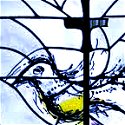
12.26.12 (Tevet 13, 5773) We tend to look on the outside of others, forgetting that their inner life is undoubtedly much like our own. But if we objectify people, if we regard them as "outsiders," we exile a large part of ourselves, and thereby risk losing something our own hearts... In this fallen and dark world, people fumble along searching for meaning, purpose, and redemption, hoping to find some warmth, kindness, and inner peace. Often they are seeking for spirituality where it cannot be found... Our salvation in Yeshua gives us access to the "inside," to a place of divine consolation, where we are given the means to take hold of the compassion, comfort, and love from the Real World. Therefore let us recognize the hurting among us and offer them courage as they walk the way of faith (Gal. 6:2).
The Birth of Messiah...

12.24.12 (Tevet 11, 5773) Though the world perverts the message of the birth of Messiah for the sake of its lust and greed, let's take a moment to reflect on its ongoing significance, namely, that God empties Himself of His regal glory and power to become your High Priest, able to fully sympathize with your weakness, frailty, shame, and chronic sinfulness (Heb. 4:15-16; Phil 2:7-8). Almighty God, the Presence of Love, becomes "one of us" so that we may be touched by Him, healed by Him, saved by Him... Therefore let's join the refrain of heavenly host: "Glory to God in the highest, and upon earth peace, among men - good will."
כָּבוֹד לֵאלהִים בַּמְּרוֹמִים
וְשָׁלוֹם עֲלֵי אֲדָמוֹת בְּקֵרֵב אַנְשֵׁי רְצוֹנוֹ
ka·vod · le·lo·him · ba·me·ro·mim
ve·sha·lom · a·lei · a·da·mot · be·ke·rev · an·shei · re·tzo·no

"Glory to God in the highest,
and upon earth peace, among men - good will."
(Luke 2:14)

Hebrew Study Card
Consider the absolute humility of God by choosing to enter into this world as "baby Jesus." Meditate on the glory and sheer paradox of God's love! "Baby Jesus" is the perfect disguise to hide the truth from the proud eyes of the flesh, but the humble of heart can see... What would do without Yeshua, friends? What hope would we really have? Regardless of the exact date of His birth, thank God that our LORD and Messiah was willing to be born into this dark world to offer Himself as our sacrificial Redeemer!
We wish you a wonderful "Christnukah" season, chaverim.
Vayechi - "And He Lived"

[ Happy Holidays, chaverim... Our Torah reading for this week is Parashat Vayechi, the last portion from the Book of Genesis, which includes Jacob's prophecy of the coming Messiah. ]
12.23.12 (Tevet 10, 5773) The final portion of the Book of Genesis (Vayechi) recounts how the great patriarch Jacob adopted Joseph's two sons (Ephraim and Manasseh) as his own children and then summoned his other sons to hear his final words. Among other things, Jacob foretold how the Messiah Yeshua would come from the line of Judah and then instructed his sons to bury him in the promised land, and not in Egypt.
After his death, Joseph and his brothers, with various dignitaries of Egypt, formed a funeral procession and returned to Canaan to bury Jacob in the Cave of Machpelah in Hebron. After the funeral, they returned to Egypt, but Joseph's brothers feared that he would now punish them for their former betrayal and threw themselves on his mercy. Joseph reassured them that they had no reason to fear him and reminded them that God had overruled their earlier intent by intending him to be a blessing to the whole world.
The portion ends with the account of the death of Joseph, who made the sons of Israel promise to take his bones with them when the LORD would bring them back to the land of Canaan (alluding to the great Exodus to come). Joseph's faith in the Jewish people's return to the Promised Land is summarized by his statement: "God will surely remember you." He died at age 110, was embalmed and placed in a coffin in Egypt, full of faith that he would be raised from the dead in the land promised to Abraham, Isaac, and Jacob.
Note: "The Torah gives light to the one who makes use of the light" (Talmud). The Hebrew word Vayechi means "and he lived," which of course refers to Jacob, but prophetically refers to Yeshua the Messiah, of whom Jacob himself foretold. In this connection note that the gematria of Vayechi (וַיְחִי) is 34, the same as the number of years of Yeshua's life. It is interesting that during this time of year, when the world at least gives "lip-service" to the birth of Jesus, the Torah portion can be read to refer to the advent of Yeshua the Messiah.
You can download the free Shabbat Table Talk for this Torah portion here:
He was Born to Die...
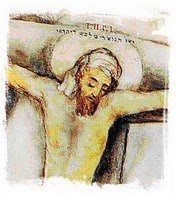
12.23.12 (Tevet 10, 5773) Regardless of your particular conviction regarding the date of Yeshua's birth, the most important thing to remember is that He was born to die (Heb. 10:5-7). The story of his birth is only significant in relation to His sacrificial death (Mark 8:27-33). The "manger" scene leads directly to the Cross at Moriah. Indeed, in Jewish tradition the day of one's death is more important than the day of one's birth, since death summarizes the meaning and significance of a person's life in this world. Birth represents potential, whereas death represents inheritance... Therefore the Jewish custom is to commemorate the anniversary of a person's death (Yahrzeit: יארצייט) and not the date of his or her birth. This custom is derived from the Scriptures themselves: "A good name is better than precious ointment, and the day of death than the day of birth" (Eccl. 7:1):
טוֹב שֵׁם מִשֶּׁמֶן טוֹב
וְיוֹם הַמָּוֶת מִיּוֹם הִוָּלְדוֹ
tov · shem · mi·she·men · tov
ve·yom · ha-ma·vet · mi·yom · hiv·va·le·do

"A good name is better than fragrant oil,
and the day of death than the day of birth."

Download Study Card
The day of Yeshua's death represents the message of the Gospel story itself: "God so loved the world that He gave His only begotten Son, that whoever believes in Him should not perish but have eternal life" (John 3:16). This is of "first importance": Yeshua was born to die for our sins, to make us right with God, and was raised from the dead to vindicate the righteousness of God (1 Cor. 15:3-5). "For our sake God made Him to be sin who knew no sin, so that in him we might become the righteousness of God" (2 Cor. 5:21). The birth of the Messiah (or rather His incarnation) was the "first step" toward His sacrifice for our deliverance (Heb. 2:9-18).
Note: This very important entry continues here.
The Meaning of Life...

12.21.12 (Tevet 8, 5773) Every human culture engages in the art of storytelling to explain its origin, its values, and its destiny. Ancient myths, fables, and folklore were devised to serve that purpose, as were various religious dramas, legends about saints, and other sagas. Since art imitates reality, however, this implies that people everywhere intuitively understand that their individual roles find meaning in the context of a larger story of which they are part... In other words, people invariably tell stories because life itself is a great story, namely, God's story (i.e., His-story), and they sense a profound need to "find themselves" in the story line. Without an ultimate story about the meaning of life as revealed in the Scriptures, however, people are left to their own imaginations and will be unsure about who they really are, why they exist, and where they are inevitably going...
בַּעֲצָתְךָ תַנְחֵנִי
וְאַחַר כָּבוֹד תִּקָּחֵנִ
ba·a·tza·te·kha · tan·chei·ni
ve·a·char · ka·vod · tik·ka·chei·ni

"You guide me with Your counsel,
and afterward You will receive me to glory" (Psalm 73:24)

Since people need to find the meaning of life in order to cope with the chaos, suffering, and apparent pointlessness of this world, they invent stories to help them find some provisional comfort. However, the story we tell ourselves - namely, where we come from, who we are, and where we are ultimately going, has profound yet very practical consequences for the development of our inner character. For instance, to instill courage we must find meaning in suffering, but that implies that we see our personal suffering as part of a larger story. Even the pagan philosopher Nietzsche said that he could withstand any "how" in life as long as he had a "why," or a reason. The heart of faith takes this a step further, however, as when the Berditchev Rebbe prayed, "O God, I don't ask you to tell me why I suffer, but only whether I suffer for Your sake." If we fail to find any real purpose for our lives, or if we are unable to believe there is a "cosmic story" behind all things, namely, God's own story, then we will surely lose heart, because the suffering we experience will seem irredeemably pointless... Indeed, secular people today are notable for their practiced heartlessness (i.e., cowardice) because they refuse to see their lives as part of God's great redemptive story. In the intellectual wasteland of the postmodern age, there is no grand narrative we can tell ourselves, there is no objective truth about what is objectively right or wrong, and there is no personal God that directs the history of the universe toward an end. Because of this propaganda, secular people today have lost the ability to discern between good and evil, and therefore they are unable to see any real difference between righteousness and unrighteousness, between villains and heroes, and consequently they are devoid of moral fiber, ethical strength, and honor of soul. Contrary to the spirit of this age, as followers of Messiah we must be resolute regarding our identity as God's redeemed children. We are in the midst of a great spiritual war, called to fight the good fight of faith, and we will overcome the world by the blood of the lamb and the word of our testimony.
Dear friends, "after you have suffered a little while, the God of all Grace (אלהֵי כָל־הַחֶסֶד), who has called you to his eternal glory in the Messiah, will himself restore, confirm, strengthen, and establish you" (1 Pet. 5:10). "So let us not lose heart... For this light momentary affliction is preparing for us an eternal weight of glory beyond all comparison, as we look not to the things that are seen but to the things that are unseen. For the things that are seen are transient, but the things that are unseen are eternal" (2 Cor. 4:16-18). May God be the strength of your heart and your portion forever (Psalm 73:26).
To ask for the "meaning of life" is to ask for the means to life, for the way to find its purpose and signficance... According to the Torah of Yeshua, there is a supreme "end of life," an overarching reason for all things, a superlative purpose for the existence of the universe and all that is in it, and that end is found in the greatest story ever told, namely, the story of the glory of God and His redemptive love for us all. This is the true message of Christmas: "For God so loved the world, that he gave his only Son, that whoever believes in him should not perish but have eternal life" (John 3:16). Let's not miss the point of the story - that God chose to enter this space-time as "one of us" so that we could be touched by Him, healed by Him, saved by Him... That's the real miracle, and it's a real miracle for every day of our lives.
 |
That which God fears...

12.21.12 (Tevet 8, 5773) "And now, Israel, what does the LORD your God require of you, but to fear the LORD your God..." (Deut. 10:12). Notice that "fear of the LORD," yirat Adonai (יִרְאַת יהוה), comes first. The sages say that to fear the LORD means that your fear should be like God's fear. But what could God possibly fear, you ask? Only this: that you will turn away from his love. To fear God doesn't mean fearing his punishment for sin, but rather that which breaches the relationship He desires with you. That is the wound of God's heart, that is what God "fears." One of the greatest of sins is to forget who you really are: a beloved child of God. To fear the LORD means you understand how dear you are to His heart...
It is written that the fear of the LORD is "the beginning of wisdom (רֵאשִׁית חָכְמָה)," but it also the beginning of the inner experience of God's love... Without the fear of the LORD, you will walk in darkness and be unable to turn away from evil (Psalm 111:10; Prov. 1:7; 9:10; 10:27; 14:27, 15:33; 16:6); you will find yourself alone, in a place of sadness and vexation, of despair and inner pain. The Spirit of God's love plainly declares that "the fear of the LORD leads to life (יִרְאַת יְהוָה לְחַיִּים, lit. "is for life"):
יִרְאַת יהוה לְחַיִּים וְשָׂבֵעַ יָלִין בַּל־יִפָּקֶד רָע
yi·rat · Adonai · le·cha·yim, · ve·sa·ve·'a · ya·lin · bal · yip·pa·ked · ra

"The fear of the LORD leads to life, and the one who has it rests satisfied
and is untouched by evil" (Prov. 19:23)

Some people tend to get this backwards, or they may underestimate the seriousness of the issue. The problem is not that people sometimes sin and therefore risk being sent to hell, but rather that people are incorrigible sinners that presently exist in state of hell... Human nature is incurably sick; the wound of our mortality is indeed fatal (Jer. 17:9; Mark 7:21-23). As Yeshua taught, the way out of bondage to sinful human nature is through the miracle of spiritual rebirth (John 3:3-8; 8:44). When we accept God's love we are delivered from the guilt that justly condemns our souls (Col. 1:13). As it is says "Whoever believes in him is not condemned, but whoever does not believe is condemned already, because he has not believed in the name of the only Son of God" (John 3:18). In other words, unless you truly repent by accepting God's love, you risk an eternally loveless existence... It must be remembered that God does not want any one to perish but for all to be in loving relationship with Him (2 Peter 3:9). "God our Savior desires all people to be saved and to come to the knowledge of the truth" (1 Tim. 2:4). However, "hell is a room locked from the inside," and if you steadfastly refuse to be loved, God Himself will respect your decision...
All this resolves to a sober question about your spiritual identity... Do you believe you are a redeemed child of God? Are you spiritually reborn? Do you accept His love and deliverance, or do you make it conditional, based on your performance? This is not about mere ethics, friends - the world is filled with various kinds of ethical philosophy, after all. No, this is a question about ontology - about who you really are; it's a question about what you are trusting, and it centers on the presence of the miracle within your heart.
We are saved by hope (Rom. 8:24). May you fall before the cross in fear of your sins, but may you be raised up by the reality of God's love for your soul... May you then walk in the awe of God's glorious mercy, "to love him, to serve the LORD your God with all your heart and with all your soul." Amen.
 |
Focus in Prayer...

12.20.12 (Tevet 7, 5773) We often need to pray before we can pray... "Lord, help me to draw near to Thee in the truth." The sages say that when you so pray, your focus should be so concentrated that you are ready to die during the prayer. Regard yourself as a living sacrifice (korban chai) and offer your blood, your body, your soul, your will upon the altar before God (Rom. 12:1). Say, "Lord, I offer myself to Thee, to do with me as Thou will. Relieve me of the bondage of myself, that I might do Thy will..." Ask for the Holy Spirit to breath out the words of God's heart; cleave to God as if you had ascended before the Throne of Grace. "O LORD, open Thou my lips and my mouth shall show forth Thy praise."
אֲדנָי שְׂפָתַי תִּפְתָּח וּפִי יַגִּיד תְּהִלָּתֶךָ
Adonai · se·fa·tai · tif·tach · u·fi · yag·gid · te·hil·la·te·kha

"O Lord, open my lips, and my mouth will declare your praise"
(Psalm 51:15)
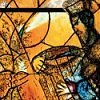
Yeshua taught us to abstain from using "vain repetitions" in our prayers, since our Heavenly Father knows what we need before we ask Him (Matt. 6:7-8). Don't worry about the verbiage of your prayers, then, since the Holy Spirit will groan on your behalf (Rom. 8:26). Ultimately prayer is a kind of teshuvah (תְּשׁוּבָה), a word often translated as "repentance," though it's more accurately understood as turning (shuv) to God in response to His call. "When you pray, rather let thy heart be without words than thy words be without heart" (John Bunyan). The point, of course, is that we come to the Lord to do real business with Him, not to play games or to offer "lip service." Are we really "showing up" when we pray?
Note: If any this seems a bit too lofty or ideal for you, then I highly recommend using my all-time favorite prayer: "HELP, O LORD!"
The Heart to Believe...

12.19.12 (Tevet 6, 5773) "Each person is obligated to give life to one's own being... through teshuvah [repentance]" (Joseph Soloveitchik). The deeper concern is not just turning away from sin, but rather turning to God; it is not just finding forgiveness but discovering your eternal acceptance; it is not the hope of escaping from hell but finding your place in heaven. As Paul Tillich once said, heartfelt faith in God's love is "the courage to accept oneself as accepted in spite of being unacceptable." God is light (1 John 1:5). You don't have to work to receive the light - it comes to you as you are, requiring only that you open your eyes to behold it... Yeshua is the answer to our heart's cry for love.
Passionate for God...

12.19.12 (Tevet 6, 5773) People sometimes get confused about being passionate for God... Serving God bekhol levavkha, "with all your heart," does not mean having a constant "high" going on, whooping it up and offering unthinking or mindless praise. After all, it is emotionally exhausting and even dishonest to put on a "happy face" all the time. Nor does passion mean chasing after various "signs and wonders," attempting to find some sort of assurance that God really is intimately involved in your life... No, spiritual fervor requires persistence, devotion, and patience, even when things appear bleak or when you are in dry places. Yeshua sweat great drops of blood in his struggle... Passion is revealed in moments of pain, of emptiness, when God seems far away or doesn't seem to answer your prayers. You press on anyway, keeping hope alive, refusing to give up...
"Blessed are those who weep while the world goes on laughing, for theirs is the comfort of heaven; blessed are the humble of heart, for they shall overcome; blessed are those who realize that they know very little, for they shall find great treasure; blessed are those who realize they are unrighteous, for they shall find healing; blessed are the misfits who are disowned by the world as fools, for they shall find their mansions in heaven; blessed are the weak, for they shall be made strong; blessed are those who mourn, for God Himself shall wipe away their tears; blessed are those who refuse to assimilate into this world and who abhor its idols, for they shall be called victors and overcomers in the world to come..."
The Advents of Joseph...
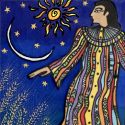
[ The following is related to this week's Torah reading, Parashat Vayigash. Please read the Torah portion to "find your place" here. ]
12.19.12 (Tevet 6, 5773) Our Torah portion this week (Vayigash) includes the dramatic (and private) revelation of Joseph to his long-lost brothers. His five word declaration, ani Yosef, ha'od avi chai ("I am Joseph; is my father alive?"), was highly prophetic, evoking the great I AM utterances of the LORD to the children of Israel. Indeed, some of the sages liken the revelation to the brothers with the great Day of Judgment itself. The Midrash Rabbah says that just as the brothers refused to hear Joseph's prophecies when he was young (i.e., Yeshua's first advent), so they were dismayed and unable to answer him when he was revealed as the exalted savior of the world (i.e., Yeshua's second advent). Joseph's rhetorical question, "Is my father alive?" can be understood as "Do you now accept my father's choice of me as his beloved son?" Hence Joseph calls Jacob avi, "my father," rather than avinu, "our father," alluding to God's providence. Note that only after this does Joseph begin to comfort his brothers and to explain his God-given role as the shepherd of Israel. And even though Joseph acknowledged the wrong done to him, he affirmed the faithful kindness of the LORD: "You meant evil against me, but God meant it for good." As the Ararbanel comments, "Joseph wanted to remove the veil of shame over their faces."
The Hebrew word vayigash (וַיִּגַּשׁ) means "and he drew near," referring first to Judah's intercession for the sins of his brothers, and then to Joseph's reciprocal desire for the brothers to draw near to him (Gen. 44:18, 45:4). Joseph initiated the reconciliation by saying, גְּשׁוּ־נָא אֵלַי / geshu na elai - "Please draw near to me," and indeed there is a play on the verb nagash (נָגַשׁ), "draw near," throughout this story. Yeshua is depicted in both the role of the rejected Jewish brother who was later exalted in the Gentile world, and as the disguised Shepherd of Israel who will draw the Jewish people back to Himself in their hour of great tribulation.... When Joseph asked, "Is my father alive," we hear Yeshua evoking the confession of faith from the Jewish people. Upon His coming revelation, all Israel will confess that indeed God the Father is "alive" and has vindicated the glory of His Son.
Note: I realize this topic is a bit complicated, but if you unpack the "parable" of Joseph, you will see both advents of Yeshua (Jesus) foreshadowed - first as the Suffering Servant who was rejected by his brothers, and second as the reigning Savior of the world...
 |
Joseph's Good Eye...
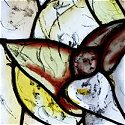
[ The following is related to this week's Torah reading, Parashat Vayigash. Please read the Torah portion to "find your place" here. ]
12.19.12 (Tevet 6, 5773) The phrase hester panim (הֶסְתֵר פָּנִים) means "hiding of the face." It is often used when discussing the Book of Esther, where God's Name isn't mentioned even once, yet the hidden Presence is manifest in the outcome of the story. In this sense of the term, hester panim is somewhat like the sun on an overcast day: Just because you don't see it doesn't mean it isn't there. God's providential care for us is at work at all times, whether we perceive it or not.
The eye of emunah (faith) ultimately affirms: gam zu l'tovah (גַּם זוּ לְטוֹבָה), "this too is for good" (cp. Rom. 8:28). Notice that the affirmation is not gam zu tovah - "this is the good," but rather gam zu l'tovah - "this, too, is for good." Emunah "sees what is invisible" (2 Cor. 4:18) and understands (i.e., accepts) that the "present form of this world is passing away" for purposes that are good (1 Cor. 7:31). It affirms that underlying the surface appearance of life (chayei sha'ah) is a deeper reality (chayei olam) that is ultimately real, abiding, and ultimately designed for God's redemptive love to be fully expressed. In this world we must "see through" a mirror (i.e., indirectly) to begin to see the dawn of our eternal home; but one day we will behold God panim el panim (פָּנִים אֶל־פָּנִים), "face to face" (1 Cor. 13:12).
Among other things the story of Joseph reveals how God's hidden hand moves for good in our lives. Despite the betrayal of the pit, and the unjust suffering of the prison house, there was light, exaltation, and joy to come forth. God knows how to take our emptiness to yield "storehouses in Egypt..." As Joseph later told his brothers, "you meant evil against me, but God meant it for good" (Gen. 50:20). Resist the temptation to judge by mere appearances. Forbid your sorrow to blind the eyes of faith. Do not unjustly judge God's purposes or try to understand His ways; accept that He works all things together (συνεργέω) for good -- making even the very wrath of man to praise Him...
וּמֵעוֹלָם לא־שָׁמְעוּ לא הֶאֱזִינוּ
עַיִן לא־רָאָתָה אֱלהִים זוּלָתְךָ
יַעֲשֶׂה לִמְחַכֵּה־לוֹ
u'me·o·lam · lo · sham·u · lo · ha·e·zi·nu
a·yin · lo · ra·a·ta · E·lo·him · zu·la·te·kha
ya·a·seh · li·me·cha·keh · lo

"From eternity no one has heard or perceived by the ear,
no eye has seen a God beside you
who works for those who wait for him"
(Isa. 64:4)
Note that Isaiah 64 centers upon the need for mercy and healing from sin: "You have hidden your face from us, and have made us melt in the hand of our iniquities," though it appeals to the salvation of the LORD that "works for those who wait for Him." King David said something similar: "I cry out to God Most High, to God who is perfecting me" (Psalm 57:2). The Apostle Paul links Isaiah 64:4 with 1 Cor. 2:7-9 by stating that the wisdom of God's plan of salvation – the wisdom of God in mystery (θεοῦ σοφίαν ἐν μυστηρίῳ) - exceeds all expectations of human wisdom or design. Note that Paul added the phrase "neither have entered into the heart of man" (a phrase used elsewhere in the Torah) to indicate that God's salvation was utterly and unimaginably beyond all human apprehension in Yeshua's wonder and glory. This is fundamental to the "good news" of the gospel message itself: It is God's wisdom and salvation alone that heals, completes, and perfects us. God Himself works for those who are waiting for Him...
 |
A Future and a Hope...
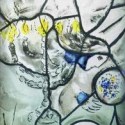
12.18.12 (Tevet 5, 5773) Life has no meaning without purpose. Just as every cause has an effect, so every desire has an implied goal or end, a possibility where the desire may be fulfilled... Some desires are used as means to an end (e.g., the desire to own a car is a means to the end of being able to travel), but there is a deeper desire that haunts the soul, an "end of ends," impelling it to seek an eternal good, an abiding happiness, an everlasting sense of home. Apart from this hope, we have no reason to get out of bed each day, to go through the motions of living in this dark world... Apart from a sense of real purpose, life is a vain circle, a place of destruction and emptiness. To deny a sense of ultimate purpose is to deny God's existence and to confess with Shakespeare that life is but "a tale told by an idiot full of sound and fury signifying nothing."
אַל־יְקַנֵּא לִבְּךָ בַּחַטָּאִים
כִּי אִם־בְּיִרְאַת־יְהוָה כָּל־הַיּוֹם
כִּי אִם־יֵשׁ אַחֲרִית
וְתִקְוָתְךָ לא תִכָּרֵת
al · ye·kan·neh · lib·be·kha · ba·cha·ta·im
ki · im · be·yi·rat · Adonai · kol · ha·yom
ki · im · yesh · a·cha·rit
ve·tik·va·te·kha · lo · tik·ka·ret

"Let not your heart envy sinners,
but continue in the fear of the LORD all the day.
Surely there is a future,
and your hope will not be cut off."
(Prov. 23:17-18)

This statement from the Book of Proverbs mirrors the famous promise given later to the prophet Jeremiah: "For I know the plans I have for you, declares the LORD, plans for healing good and not for evil, to give you a future and a hope" (Jer. 29:11). May each of us have faith of heart to proclaim: "The LORD will fulfill His purpose for me; Your steadfast love, O LORD, endures forever! Do not let go of the work of Your hands" (Psalm 138:8).
Glory in the LORD...

12.18.12 (Tevet 5, 5773) While on the one hand we should be careful to rightly esteem and revere the Messiah as our incomparable LORD and only Savior who is entirely without any rival or equal, on the other hand we should remember that He willingly made himself "equal" with the worst of sinners by taking their place on the cross. Other world religions may have some idea about the transcendence of God, but only our faith regards God's love and power as so great that it extends to all possible worlds, even touching and entering into the world of human pain, shame, guilt, abandonment, and the grief of death itself. Only our faith gives glory to God for actually entering the realm of humanity, for willingly touching the leper, for choosing to become a stranger, an outcast, a slave, for the sake of genuinely interceding for sinners and outcasts... Other religions may talk about God's compassion, but only Yeshua expresses the heart and love of God for the lost soul.
אֲבָרֲכָה אֶת־יְהוָה בְּכָל־עֵת
תָּמִיד תְּהִלָּתוֹ בְּפִי
בַּיהוָה תִּתְהַלֵּל נַפְשִׁי
יִשְׁמְעוּ עֲנָוִים וְיִשְׂמָחוּ
a·va·ra·kha · et · Adonai · be·khol · et
ta·mid · te·hil·la·to · be·fi
badonai · tit·hal·lel · naf·shi
yish·me·u · a·na·vim · ve·yis·ma·hu

"I will bless the LORD at all times;
his praise shall continually be in my mouth.
My soul makes its boast in the LORD;
let the humble hear and be glad."
(Psalm 34:1-2)

"I will bless the LORD" (אֲבָרֲכָה אֶת־יְהוָה) – this is cohortative, meaning that it is based on a decision; it comes as a result of inwardly directing or commanding the focus of the heart... "At all times" (בְּכָל־עֵת) refers to every situation, in both prosperity and in testing; in safety and in danger; in joy and in sorrow. As it is said, gam zu l'tovah: "this too is for the good..." There is no time when God should not to be praised for the gift of life – even in the darkest of hours - and therefore an attitude of gratitude is fitting for the chasid, a person of piety and real faith. As the Bratzlover Rebbe once rightly said, "You live in paradise when you know that whatever happens to you happens for your good" (Rom. 8:28). Perfect peace comes to one whose mind is "stayed" upon the LORD in trust (Isa. 26:3).
Every moment of life is a gift given to you from above, and therefore we are indebted to the Lord for our every breath. We must learn to be mindful and awake before the Divine Presence. "At all times" means you are to consciously "know Him" in all your ways (Prov. 3:6). Like king David, "set the LORD" before your eyes (Psalm 16:8) and become alive to the wonder and glory that surrounds and upholds your very life...
The words "praise" and "boast" in this passage come from a root word (i.e., hallal: הָלַל) that means to "shine" (like a "halo"), that is, to become radiant over the goodness of God. The Targum renders, "my soul makes its boast in the LORD" (בַּיהוָה תִּתְהַלֵּל נַפְשִׁי) as "my soul boasts in the Word of the Lord," the Memra or Logos of God. The Apostle Paul undoubtedly had this in mind when he wrote of the "disguised" wisdom of the gospel message: "Let the one who boasts, boast in the Lord" (2 Cor. 1:31).
But why should "the humble hear and be glad" over David's deliverance? Because heartfelt praise finds audience with those who have been beaten down with the experience of their own afflictions and evil, and therefore the prosperous and the powerful of this world are unable to understand the desperate need for divine remedy, and therefore will never find praise to be a heartfelt expression of their hope and deliverance... Indeed, what is the significance of praise apart from suffering and trouble? Can a person immune from all affliction ever come to praise God for His deliverance, after all?
 |
Hiddenness and Providence...
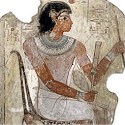
[ The following is related to this week's Torah reading, Parashat Vayigash. Please read the Torah portion to "find your place" here. ]
12.18.12 (Tevet 5, 5773) The term hashgachah (הַשְׁגָּחָה, i.e., "supervision") is sometimes used to refer to God's providential decrees as Ribbono shel olam (רִבּוֹנוֹ שֶׁל עוֹלָם), "the Master of the Universe." A midrash says, "God appoints an angel and tells it to cause a blade of grass to grow. Only then does that tiny blade flourish" (Bereshit Rabbah). There are no coincidences in God's universe; no "butterfly effect" apart from His hand.
Joseph's brothers finally understood they were merely pawns in God's great master plan to save the Jewish people. While they had earlier sold Joseph for their own selfish reasons, God overruled them to effect His own sovereign purposes. Naturally, people make choices they believe will further their own goals, desires, agenda, or "end." Consciously or not, they typically choose what they think is best for them at the time, and acting upon such desire they mistakenly believe is "life." To be spiritually alive, however, means to make choices le'shem shamayim, for the sake of truth, and to live empowered by the grace of God's Spirit. The Hebrew word for "life" is chayim (חַיִּים), a plural noun that contains two consecutive Yods (יי), symbolizing the union of our spirit with God's Spirit... To be truly alive is a miracle that raises you from the dead (i.e., the realm of the natural) to be an agent of God's redemptive purposes in this world. Our living union with Yeshua is life!
Note: While God oversees and directs all of history toward its final end, this does not imply fatalism: "Providence means that the demonic and destructive forces within ourselves and our world can never have an unbreakable grasp upon us, that there is a creative and saving possibilty in our every circumstance, and the bond that connects us with fulfilling love can never be disrupted" (Paul Tillich). Faith believes that with God all things are possible, and that means that in every possible world His healing love is Present for us.
 |
Joseph the Righteous...
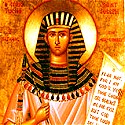
[ The following is related to this week's Torah reading, Parashat Vayigash. Please read the Torah portion to "find your place" here. ]
12.17.12 (Tevet 4, 5773) According to Jewish tradition, Joseph is the only Torah personality referred to by the sages as a tzaddik (צַדִּיק), a "righteous person" who never succumbed to his desires by acting upon them. Notwithstanding the inner pain he felt over the rejection of his own brothers and their betrayal, in all his years in hedonistic Egypt, both as a slave and later as a ruler, Joseph never let the yetzer hara, the evil inclination, overmaster him. In that sense, too, he is a picture of Yeshua our Lord, who was tempted in every way as we are, yet was without sin (Heb. 4:15).
Note: The patriarch Joseph was a sinner, of course, but recall that the sacrifice of Isaac by Abraham (i.e., the Akedah) pictures the love of God the Father offering his Son, and yet Abraham was not sinless, nor was Isaac, who was clearly a picture of Yeshua. For a bit more on this subject, see the Gospel of Moses as well as its related links...
 |
The Disguised Egyptian...
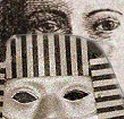
[ Note that it was only after Judah took responsibility amd acknowledged the special love his father held for Joseph that the disclosure of Joseph's identity was made... ]
12.17.12 (Tevet 4, 5773) Just before he revealed his true identity to them, Joseph ordered all the Egyptians out of the room. According to midrash, Joseph then turned to his brothers and said, "You told me that your brother Joseph died. Are you sure?" "Yes, we are; he's dead," the brothers assured him. Joseph then became angry and said, "How can you lie? You sold him as a slave. I bought him and can call him right now." Joseph then called out, "Joseph, son of Jacob, come here right now to speak to your brothers." Terrified, the brothers turned to see if Joseph was coming....
Note: For more on this fascinating topic, see "The Disguised Egyptian." Also consider the Purim pages and the relationship between "hiding" and "revealing" in our lives.
What are you seeking?
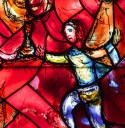
12.17.12 (Tevet 4, 5773) Desire is to the heart what belief is to the truth, and indeed we come to believe the truth through the desire for real life. Therefore it is written in the Scriptures: "May all who seek You rejoice and be glad in You; may those who love Your salvation say continually, yidgal Adonai, "great is the LORD!"
יָשִׂישׂוּ וְיִשְׂמְחוּ בְּךָ כָּל־מְבַקְשֶׁיךָ
יאמְרוּ תָמִיד יִגְדַּל יְהוָה אהֲבֵי תְּשׁוּעָתֶךָ
ya·si·su · ve·yis·me·chu · be·kha · kol · me·va·ke·she·kha
yo·me·ru · ta·mid · yig·dal · Adonai · o·ha·vei · te·shu·a·te·kha

May all who seek You rejoice and be glad in You;
may those who love Your salvation say continually, "Great is the LORD!"
(Psalm 40:16)

Just as with physical life, spiritual life is marked by hunger, by thirst... The problem for many of us is not that we lust, but that we do not lust enough - for the true good that only God gives. The LORD tests the heart by always asking us: What are you seeking?
Note: Some people tend toward religious "legalism" because developing inward character by exercising real faith is considerably more difficult than simply conforming to an external code of behavior. Others may tend toward "licentiousness," the so-called liberty to walk carelessly before the Divine Presence, for the same reason. Both of these approaches trifle with spirituality. The true freedom given by the Holy Spirit is an inner freedom (and will) to walk in the grace of God's love. God's love sets us free from the need to "manage appearances" or to justify ourselves. We are reborn to live in an entirely different order of reality itself. Indeed, Yeshua has given "new life to life itself" - He has become the "Author of Eternal Salvation" for those who trust in Him (Heb. 5:9).
 |
Parashat Vayigash - ויגש

[ The following is related to this week's Torah reading, Parashat Vayigash. Please read the Torah portion to "find your place" here. ]
12.16.12 (Tevet 3, 5773) In this week's Torah portion (Vayigash) we read about Joseph's dramatic revelation of his identity to his long lost brothers. Recall that Benjamin had been framed for stealing the Viceroy's chalice and was arrested and brought before Joseph for immediate judgment. Judah then "drew near" (vayigash) and offered to bear the penalty for his brother, pleading with Joseph to spare his aged father the loss of yet another son. Joseph was so moved by Judah's act of mesirat nefesh (self-sacrifice) that he decided the time had finally come for him to reveal his identity to his brothers. After clearing the room, he began speaking in Hebrew and said, אֲנִי יוֹסֵף הַעוֹד אָבִי חָי / ani Yosef, ha'od avi chai / "I am Joseph; is my father alive?" When the brothers drew back in dismay, Joseph said, "Draw near to me, please" (from the same verb nagash) and explained how God providentially brought him to Egypt to save the family's life....
The revelation of Joseph and his reconciliation with his brothers is a prophetic picture of the acharit hayamim (end of days) when the Jewish people will come to understand that Yeshua is indeed the One seated at the right hand of the majesty on high as Israel's Deliverer. At that time Yeshua will speak comforting words to His long lost brothers and restore their place of blessing upon the earth. Indeed, the entire story of Joseph is rich in prophetic insight regarding our Lord and Savior. Vayigash (וַיִּגַּשׁ) means "and he drew near," referring first to Judah's intercession for the sins of his brothers, and then to Joseph's reciprocal desire for the brothers to draw near to him (Gen. 44:18, 45:4). Joseph initiated the reconciliation by saying, גְּשׁוּ־נָא אֵלַי / g'shu na elai - "Please draw near to me," and indeed there is a play on the verb nagash (נָגַשׁ), "draw near," throughout this story. Yeshua is depicted both in Judah's intercession (as the greater Son of Judah who interceded on behalf of the sins of Israel) and in Joseph's role as the exalted Savior of the Jewish people in time of tribulation. When Joseph disclosed himself and asked, "Is my father alive," we hear Yeshua evoking the confession of faith from the Jewish people: "I am Yeshua: do you now understand that My Father is alive?" Upon His coming revelation, all Israel will confess that indeed God the Father is "alive" and has vindicated the glory of His Son.
Note: You can download a free Shabbat Table Talk for Vayigash here:
Some more Chanukah Pictures...
Here are a few pictures of the last two days of Chanukah. We have enjoyed eating holiday foods (including latkes, sufganiyot), reciting the blessings, singing hymns, playing dreidel, and enjoying fellowship over the last week. Now on to Christnukah! ;)
(Left-to-right) 1. Josiah; 2. John and Judah; 3. Olga; 4. Judah
(bottom) 1. Vadim; 2. Amy and Gabe; 3. a family shot; 4. festival of lights!
The Fast of Tevet...
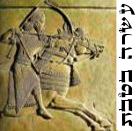
12.16.12 (Tevet 3, 5773) This coming Sunday, December 23 is Asarah B'Tevet ("the Tenth of Tevet"), which is the traditional date that recalls the start of Nebuchadnezzar's attack on Jerusalem (in 587 BC) that led to the destruction of the Holy Temple and the eventual exile of the Jewish people. Religious Jews observe this date as a "minor" fast day (i.e., a fast observed from sunrise to sunset) to recall the tragedy and to afflict their souls.
In Israel, Asarah B'Tevet also marks the day Kaddish (memorial prayer) is traditionally recited for people whose date or place of death is unknown. This has resulted in a day of mourning for the many Jews who perished during the Holocaust (in addition to the formal commemoration of Yom HaShoah). Synagogue services normally include prayers of repentance (selichot) and the Torah portion recalls the story of the idolatry of the Golden Calf (i.e., Exod. 32:11-34:10).
Messianic Jewish scholar Alfred Edersheim wrote that an early Aramaic source document called "The Scroll of Fasts" (i.e., Megillat Ta'anit: מְגִילַת תַעֲנִית), which included additional commentary in medieval Hebrew (called scholium), may refer to the 9th of Tevet as the day of Yeshua's birth (i.e., sometime during late December in our Gregorian calendars). Note that Jewish history regards the month of Tevet to be one of national tragedy, marking the beginning of the destruction of the Holy Temple by Nebuchadnezzar, King of Babylon (in 587 BC). After the destruction of the Second Temple in 70 AD, the early sages might have associated the birth of Yeshua as yet another reason for mourning the loss of the Temple on this date. (For more about the controversial date of the birth of Yeshua, see the article, "Christmas: Was Jesus really born on December 25th?")
 |
Trust Despite Darkness...
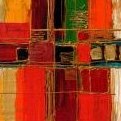
[ Our earnest prayers go out on behalf of the victims of the school shootings in Newtown Connecticut, as well as to those children who were attacked in Chenpeng, China... ]
12.14.12 (Tevet 1, 5773) Despite the horrendous evils that we regularly see in this fallen world - both the moral wickedness of depraved sinners as well as the physical tragedies of natural disasters, of sicknesses, and of physical death itself - there is something within the human heart - the cry of love's protest - that appeals to God's love and justice despite our pain... The soul testifies that there is "unfinished business," that there is more than meets the eye, that evil will not have the last word, and that tears will one day forever be wiped away. Despite the ambiguity, faith "hopes against hope" that the LORD God will intervene and bring everlasting healing to us all. As it says, "Let him who walks in darkness and has no light trust in the Name of the LORD (יִבְטַח בְּשֵׁם יְהוָה) and rely on his God" (Isa. 50:10).
מִי בָכֶם יְרֵא יְהוָה שׁמֵעַ בְּקוֹל עַבְדּוֹ
אֲשֶׁר הָלַךְ חֲשֵׁכִים וְאֵין נגַהּ לוֹ
יִבְטַח בְּשֵׁם יְהוָה וְיִשָּׁעֵן בֵּאלהָיו
mi va·khem ye·rei Adonai sho·mei·a be·kol av·do
a·sher ha·lakh cha·she·khim ve·ein no·gah lo
yiv·tach be·shem Adonai ve·yi·sha·en be·lo·hav

"Who among you fears the LORD and obeys the voice of his servant?
Let him who walks in darkness and has no light
trust in the Name of the LORD and rely on his God."
(Isa. 50:10)

Trusting in God (i.e., bittachon - בִּטָּחוֹן) does not mean that we are obligated to affirm that this is "the best of all possible worlds," though it does mean we believe that eventually God will wipe away every tear and make all things right... Bittachon is a word for this world, which says, "Though he slay me, I will trust in him..." Those who call upon the LORD can trust not only in concealed good behind ambiguous appearances ("all things work together for good") but also in a future, real, substantive good that will one day be clearly manifest for us all... Meanwhile, may God keep us from such depth of sorrow that leads to sickness, darkness and despair. Shabbat Shalom and Chodesh Tov, chaverim.
Teshuvah's Like-for-Like...

[ Our Torah reading for the Shabbat of Chanukah is parashat Miketz, i.e., Gen. 41:1-44:17. ]
12.14.12 (Tevet 1, 5773) It is said that genuine teshuvah (repentance) is evident when a person is confronted with the same temptation to which he previously succumbed, but successfully withstands the test and resists. Joseph's brothers demonstrated teshuvah when they refused to abandon their father's favorite son to the "pit" of an Egyptian prison cell (Gen. 44:16-17). Once the brothers offered to suffer the same fate as falsely accused Benjamin, Joseph knew they had repented and were no longer the same people who had betrayed him when he was a young man...
Slavery to the World...

[ The eight-day Festival of Chanukah runs from Dec. 8th - 16th this year... ]
12.13.12 (Kislev 29, 5773) We are commanded not to love the world (κόσμος), nor the things this world values, since doing so embraces a philosophy of life, or spirituality, that is at war with the Father and contrary to the truth of the Eternal (1 John 2:16; James 4:4). The fallen world values "the flesh" and the "desire of the eyes" that is patterned according to the "arrogance of life"; it is a "beauty pageant" that esteems others based on their accidental qualities instead of their inner and essential qualities....
The world values other people as means to an end rather than as ends in themselves, and therefore is inherently violent and exploitative. The flesh is the realm of the all-too human, the selfish, the natural, the ordinary, and the tit-for-tat, where love and acceptance are extended solely in conditional terms (Matt. 5:46-47). In this connection, allow me to quote the late Henri Nouwen regarding the danger of becoming enslaved to this world and its perverse value system:
"At issue here is the question: To whom do I belong? God or to the world?" Many of my daily preoccupations suggest that I belong more to the world than to God. A little criticism makes me angry, and a little rejection makes me depressed. A little praise raises my spirits, and a little success excites me. It takes very little to raise me up or thrust me down....
As long as I keep running about asking: "Do you love me? Do you really love me?" I give all power to the voices of the world and put myself in bondage because the world is filled with "ifs." The world says: "Yes, I love you if you are good-looking, intelligent, and wealthy. I love you if you have a good education, a good job, and good connections. I love you if you produce much, sell much, and buy much." There are endless "ifs" hidden in the world's love. These "ifs" enslave me, since it is impossible to respond adequately to all of them. The world's love is and always will be conditional. As long as I keep looking for my true self in the world of conditional love, I will remain "hooked" to the world - trying, failing, and trying again. It is a world that fosters addictions because what it offers cannot satisfy the deepest craving of my heart" (Henri Nouwen - Return of The Prodigal Son).
Note: For more on this vital subject, see the Chanukah article, "Love not the World."
The Miketz Prophecies...

[ Our Torah reading for the Shabbat of Chanukah is parashat Miketz, i.e., Gen. 41:1-44:17. ]
12.13.12 (Kislev 29, 5773) Our Torah portion this week is miketz (מקץ), a word that means "at the end," and therefore it points to the prophetic future (i.e., the "end of days" or acharit ha-yamim). Just as Joseph was a "dreamer" who was betrayed by his brothers but was promoted to a place of glory by the hidden hand of God, so Yeshua was betrayed by his people yet was exalted over all the nations (מֶלֶךְ הַגּוֹיִם). And just as Joseph later disguised himself as a "stranger" and an "Egyptian" to his brothers but was finally revealed to be their savior, so will the Jewish people come to see that Yeshua is the true Savior of Israel.
Note: For more on this important topic, see "Joseph and his brothers."
Chanukah vs. Humanism...
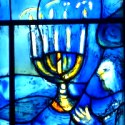
[ The following entry very briefly explores some of the reasons why the conflict between the ancient Greeks and the Jewish people was so significant... ]
12.13.12 (Kislev 29, 5773) We read in the New Testament that "the Greeks seek for wisdom" (1 Cor. 1:22), which of course does not refer to the ethical wisdom of the Torah (i.e., chokhmah: חָכְמָה), but rather to the venture of the human intellect to investigate and speculate about the nature of "ultimate reality." Since Greek culture during the time of the Second Temple was without a viable religious outlook (it's earlier pantheon of Olympian gods had been abandoned by that time), various Greek philosophers arose to fill the void by offering an account of the nature of the universe. Some of these philosophers sought abstract essences and archetypal patterns, while others regarded reality as a product of random chance (or fate) that rendered it essentially unknowable. What was common to these speculative approaches, however, was faith in the power of human reason to discover truth apart from older mythological explanations.
Despite the fact that ancient Jewish culture likewise valued truth and wisdom, in general the sages of the Second Temple period regarded Greek humanistic wisdom as chokhmah hachitzonit, "superficial wisdom," since it wasn't deeply grounded in the revelation and conviction of a moral Lawgiver who was the Sovereign Center and purposive cause for everything that existed. For this reason the Greek worldview was deemed spiritually dangerous, since it surreptitiously implied that Torah should be understood in strictly human terms, a product of mere men, rather than as special revelation directly given from the LORD God. At issue, then, was a clash between the role of faith and the role of reason...
It should be noted here that Hellenism was a philosophical outlook of life that offered enlightenment to the ancient world. Indeed, the word "Hellenist" does not refer to the ancient Greeks as much as all those who adopted the Greek cosmopolitan lifestyle, and that of course included many Jews of that period. Nonetheless, the Torah sages regarded such humanistic philosophy as devoid of ultimate value, since it had an inadequate and essentially "heartless" view of the person. The Hellensistic outlook did not regard people as moral agents created in the image and likeness of God Himself, and despite its idealization of the human being, Greek humanism (like humanistic philosophy today) had no metaphysical basis for the worth and dignity of people. Because of this, ancient Greek society, like ancient Egypt, justified slavery, the abuse of women, and ruthless exploitation. Jewish thought, on the other hand, understood people as inherently worthy, "deities in miniature," and therefore they sought to be merciful, chaste, and charitable in their relationships.
The spread of Greek language and culture in the ancient world was not entirely bad, however, and indeed was providentially used by God. The translation of the Hebrew Torah into common Greek (the "Septuagint") in the 3rd century BC clearly prepared the world for the universal message of the gospel, and even today helps us understand the words of the ancient Greek New Testament better. Moreover, the Septuagint provides irrefutable proof that the Hebrew Torah text was well-attested in ancient times, which refutes slanderous claims made by Islam (and others) that Jewish people "rewrote" the words of Torah to contradict the Koran... For instance, when proponents of Islam claim that the Koran provides the true Torah and that the Jewish Scriptures were (later) changed to contradict with it (e.g., Ishmael, not Isaac, was offered by Abraham, etc.), the existence of the Septuagint, dating over 1,000 years before the rise of Islam, proves the claim wrong (as does the discovery of the Dead Sea Scrolls). Indeed, what is clear is that the Koran's later version of the narratives of the Torah are corrupt, and this is a factual matter that can be known to be true by anyone who cares to investigate the matter honestly...
 |
Love's Desperate Hunger...

12.12.12 (Kislev 28, 5773) There is a loneliness of heart that only God himself can take away... If we are looking for someone (or something) to make us feel better inside - to assuage the secret abandonment of our soul - we will inevitably face our inner heartache again. No poet can adequately express our pain; no human romance can withstand the ravages of time. God wants us to cling to him, to depend on him to fill up the abyss of our emptiness, and only then we will be enabled to nurture relationships with others. It is unfair (and exhausting) to demand others to meet the need that only God Himself can rightly supply, but God has promised to always be more than enough for what we really need...
Chanukah and Vigilance...
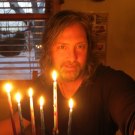
[ The eight-day Festival of Chanukah runs from Dec. 8th - 16th this year... ]
12.12.12 (Kislev 28, 5773) The message of Chanukah is to resist being "assimilated" into this dark world and its benighted culture. As it says, "Do not be conformed to this world, but be transformed (i.e., transfigured by the light) through the renewal (ἀνακαίνωσις) of your mind, that by testing you may discern what is the will of God" (Rom. 12:2). Notice that the Greek word translated "conformed" is a passive verb (συσχηματίζω, derived from σύν, "with," + σχῆμα, "matrix") which means that we must consciously resist being lulled into accepting this world's various ideologies (matrix) that are crafted to ignore Divine the Presence and Truth. In the realm of the spiritual, there is simply no place of neutrality, and if we are not going forward, then it's likely we are going backward... Therefore we are repeatedly commanded to test the spirits and to examine truth claims. We ask God for wisdom and use the discernment that comes from the Ruach HaKodesh (Holy Spirit).
הַשְׁלִיכוּ מֵעֲלֵיכֶם אֶת־כָּל־פִּשְׁעֵיכֶם
אֲשֶׁר פְּשַׁעְתֶּם בָּם
וַעֲשׂוּ לָכֶם לֵב חָדָשׁ וְרוּחַ חֲדָשָׁה
hash·li·khu · me·a·le·khem · et · kol · pish·e·khem
a·sher · pe·sha·e·tem · bam
va·a·su · la·khem · lev · cha·dash · ve·ru·ach · cha·da·shah

"Cast away from you all the transgressions
that you have committed,
and make yourselves a new heart and a new spirit."
(Ezek. 18:31)

Hebrew Study Card
We must exercise diligence to ensure that we are not made captive to the world and its seductive deceptions. Both Passover and Chanukah celebrate spiritual freedom, and indeed the very first word given at Sinai was "I AM the LORD thy God who brought you out ... from bondage" (Exod. 20:2). God's first concern is to be known as your Deliverer, the God of your freedom. Therefore the Spirit of God says, "Thou shalt be free" (2 Cor. 3:17; Gal. 5:1). Set your focus, then, on the Divine Presence and refuse to live in fear, chaverim.
Wisdom for Chanukah...

[ The eight-day Festival of Chanukah runs from Dec. 8th - 16th this year... ]
12.11.12 (Kislev 27, 5773) The world has everything backwards. The world worships human power, excuses all manner of violence and selfish lust, idealizes personal fame, colludes with seductive beauty, and abhors sickness and death, but the Spirit of God teaches that we only find true fulfillment when we become utterly empty for God. And just as a seed dies before it releases its hidden life, so we give our lives away to find ourselves; we let go to be sustained; we surrender to be lifted up in God's victory...
תְּנָה־בְנִי לִבְּךָ לִי
וְעֵינֶיךָ דְּרָכַי תִּצּרְנָה
te·nah · ve·ni · li·be·kha · li
ve·e·ne·kha · de·ra·khai · ti·tzor·nah

"My son, give me your heart,
and let your eyes observe my ways."
(Prov. 23:26)

The princes of this world are given warning from heaven (Psalm 2). Plutarch tells the story of how Alexander the Great came upon Diogenes looking attentively at a heap of human bones. "What are you looking for?" asked Alexander. "Something that I cannot find," said the philosopher. "And what is that?" "The difference between your father's bones and those of his slaves." (retold by Anthony de Mello)
Essence of Chanukah...
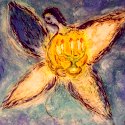
[ The eight-day Festival of Chanukah runs from Dec. 8th - 16th this year... ]
12.11.12 (Kislev 27, 5773) The essence of Chanukah is simply to receive the light, to bear witness of the radiance of God's victory. We celebrate the work of God, his salvation, and the triumph of his love. Therefore its message is "wake up, open your eyes, and believe" the good news: darkness and despair will not prevail; your mourning will find comfort, your grief its solace. Your heart's deepest longing shines brightly, even now, if you will but believe....
קוּמִי אוֹרִי כִּי בָא אוֹרֵךְ
וּכְבוֹד יְהוָה עָלַיִךְ זָרָח
ku·mi o·ri ki va or·rekh
ukh·vod Adonai a·la·yikh za·rach

"Arise, shine, for your light has come,
and the glory of the LORD has risen upon you."
(Isa. 60:1)

Hebrew Study Card
The LORD said to Moses from the midst of the shining flame: 'Take off your sandals from your feet, for the place on which you stand is holy' (Exod. 3:5). The Chofetz Chaim comments: We all need to rise higher... Never say, I will be able to lift myself up at another time or different place. By faith see that this place, right now, is holy ground, and awaits your response. May God open the "eyes of your heart" to help you see (Eph. 1:18-19).
Remembering Grace...
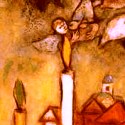
12.11.12 (Kislev 27, 5773) Whenever you are in distress or experiencing anguish of heart, consciously call to mind the good you have experienced in the past, and then ask God for relief for the present hour of testing. First focus on the good and remember grace, and then come make your petition before God. As it says, "I will offer a thank offering to You, and call on the name of the Eternal."
לְךָ־אֶזְבַּח זֶבַח תּוֹדָה
וּבְשֵׁם יְהוָה אֶקְרָא
le·kha · ez·bach · ze·vach · to·dah
uv·shem · Adonai · ek·ra

"I will offer a thank offering to You,
and call on the Name of the Eternal."
(Psalm 116:17)

"God is able to make all grace overflow (περισσεύω) to you, so that having all sufficiency in all things at all times, you may overflow (περισσεύω) in every good work" (2 Cor. 9:8). "Fear not, little flock, for it is your Father's good pleasure to give you the kingdom" (Luke 12:32).
Honesty and Humility...

12.11.12 (Kislev 27, 5773) An honest person is a humble person, since honesty compels the soul to confess the truth that it is profoundly ignorant, incapable of understanding even the simplest matters of life, and entirely powerless to heal itself... People argue over words, concepts, and abstractions, inflating their opinions above even the Reality they purport to define, but the humble soul acknowledges that he doesn't really know much about anything... And if "all the efforts of the human mind cannot exhaust the essence of a single fly," then how is it that people get puffed up and proud regarding their supposed knowledge of God Himself? Far better to approach God in deep reverence, wonder, love, and childlike trust than to profess a theology based on pride and illusions...
To a visitor who described himself as a seeker after Truth the sage said, "If what you seek is Truth, there is one thing you must have above all else." "I know," said the man, "an overwhelming passion for it." "No," the sage replied, "rather an unremitting readiness to admit you may be wrong."
Thomas Aquinas' most significant work was his Summa theologiae or 'Summary of Theology,' a massive book that attempted to "systematize" all of Christian theology. He worked on it for many years, but when he was nearly finished he underwent a spiritual experience that, as he himself explained, made everything he had written "seem like straw." He thereafter gave up writing about "theology" after he encountered the Reality itself. You may perfect doctrine and exist untruthfully, whereas you might not have perfect doctrine, but exist truthfully. The devil knows how to quote Scripture, and often does so, but is a devil still.
וְארַח צַדִּיקִים כְּאוֹר נגַהּ
הוֹלֵךְ וָאוֹר עַד־נְכוֹן הַיּוֹם
ve·o'·rach · tza·dee·keem · ke·ohr · no'·gah
ho·leikh · va·ohr · ad-ne·khon · hai·yohm

"But the path of the righteous is like the light of dawn,
which shines brighter and brighter until full day."
(Prov. 4:18)

Of course truth is important, and we ask for God's revelation by the power of the Holy Spirit, but this means knowing from a place of real humility... We must follow the path of peace, even if that requires that we "overlook" some of our doctrinal convictions for the sake of love. I don't mean we should throw away our principles, God forbid, but we rather hold them with an inward passion that is at the same time willing to be overlooked, to suffer, to be misunderstood, and even to be mistreated by others. The key here is not be indulge in self-pity or resentment, which does no good. And above all we ask God for divine wisdom. God is faithful and true; if we ask Him for bread, he won't give us a stone (Luke 11:11).
Chanukah Day 2
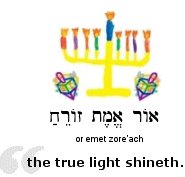
12.10.12 (Kislev 26, 5773) We celebrated the second day of Chanukah at our home, digging out from about a foot of snow that fell... Olga made some delicious latkes and we played dreidel after dinner. Here are a few pictures of the family kindling the lights:
Left-to-right (top): 1. Judah; 2. Josiah; 3. John; 4. Olga
(bottom): 1. John w/boys; 2. dreidels and tops; 3. Judah; 4. the "reason for the season"
The midrash associates the tohu va'vohu, the utter darkness of primordial creation, with the darkness of exile under the Greeks, and yet many Jews prospered and enjoyed liberty at that time. Many assimilated the culture and dressed, spoke, and lived as the cosmopolitan Greeks; they enjoyed life and were well off. And yet this is the very worst kind of exile - to be so absorbed into the darkness that you can no longer apprehend the light... The message of Chanukah is that the light of God's truth forever overcomes the darkness of this evil world. As Yeshua said, "I have come into the world as light, so that whoever believes in me may not remain in darkness" (John 12:26).
If one would describe the confusion of the modern age, I know of no more descriptive word than: it is dishonest. Young people, even children, are aware of how fraudulent everything is and how everything depends on clinging to their generation, following the inconstant demands of the age... Everything, absolutely everything is calculated to nourish this confusion, the unholy taste of the wild hunt. The means of communication become more and more excellent, but the communications become more and more hurried and more and more confusing. And if anyone dares, either in the name of originality or of God, to resist it – woe unto him!" (Soren Kierkegaard)
"Everyone who does wicked things hates the light and does not come to the light, lest his works should be exposed, but whoever does what is true comes to the light, so that it may be clearly seen that his works have been carried out in God" (John 3:20-21).
Happy Chanukah!

12.10.12 (Kislev 26, 5773) We celebrated the first day of Chanukah at our home with some family members and a few friends. It was a time for reciting the blessings, lighting the candles, eating some latkes, listening to music, spinning the dreidle, and so on. Thank God for Yeshua, our Light and Salvation. From our family to yours: Chag Urim Same'ach!
Left-to-right (top): 1. Judah at the window; 2. Josiah lights his menorah; 3. John; and 4. Olga
(bottom): 1. Vadim and Irina; 2. Amy and Gabe; 3. Aurora; and 4. Peter
The Torah records that God's first words were "Let there be light" (i.e., yehi or: יְהִי אוֹר) and then goes on to say that "God separated (וַיַּבְדֵּל) the light from the darkness (Gen. 1:3-4). It is this "separation," or distinction, that is foundational to the concept of kedushah (קְדֻשָּׁה), or "holiness," which first appears in the Scriptures regarding the distinction between ordinary and sacred time: "God blessed the seventh day and made it holy" (יְקַדֵּשׁ) because on it God rested from all his work that he had done in creation" (Gen. 2:3). Those who belong to God are called "children of light," called apart from the darkness of the world. Indeed our Lord Yeshua said that the very purpose of salvation is "to turn from darkness to light and from the power of Satan to God" (Acts 26:18).
When the darkness seems to overwhelm you, pray for God's light to be rekindled within your soul. Keep faith that your gloom will soon pass, and that darkness and despair will not be your end. Your mourning will find its comfort, your grief will find its solace. Ask God to transform your inner loneliness, your hunger for connection, your need to be seen and appreciated, into courage to help you live and die for the truth of His love.
From our family to yours: Chag Urim Same'ach (Happy Festival of Lights).
 |
Parashat Miketz - מקץ

[ The Festival of Chanukah runs from Saturday, Dec. 8th through Sunday, Dec. 16th this year. Unlike Passover and Sukkot, the weekly Torah reading is not suspended for Chanukah, though additional passages from the Torah are read for each of the eight days of the holiday. ]
12.10.12 (Kislev 26, 5773) In our Torah portion for Chanukah week, parashat Miketz, Joseph interpreted Pharoah's dreams and rose to great power in Egypt. Because of severe famine in the land of Canaan, however, his brothers came to Egypt in search of food. A disguised Joseph then tested his brothers to see whether they had undergone teshuvah...
For more information, please see the summary page for Miketz and its related articles. You can also download the free Shabbat "Table Talk" for this portion here:
Ask for the Sake of Love...

12.07.12 (Kislev 23, 5773) Our Lord instructed us, "If you ask anything in my Name, I will do it" (John 14:14). We do not petition God in our own name, that is, by trusting in our own supposed merits or spirituality, but rather we petition in the name of Yeshua, which means trusting in His sufficiency as our High Priest and Mediator before the Throne of God. We plead in the merit of His work, trusting in the great Redemption of God: "the life is in the blood" (Lev. 17:11). Asking "in the name" of Yeshua therefore expresses our confidence that we have been accepted and given audience because of the love demonstrated at the cross; it is to make appeal for the sake of God's great love, expressing full agreement with the heart and purposes of God as revealed by the Holy Spirit of truth... There is no other Name than the Name above all Names (Acts 4:12; Phil. 2:9-10).
We must use a "good eye" (טוֹב־עַיִן) to attain shalom, that is, healing and inner peace. We must believe to see the good, even in ourselves, and to decisively accept that we are beloved because of Yeshua. As we surrender to God's great love for our lives, we will be more connected with the gift of the present moment... The past is gone, after all, and the future is God's business: all we have is this time to walk in the grace and love of God. Awaken to the Eternal in the present hour, and ask for renewal and life in Yeshua. In this way we may experience the peace of God, which drives away all regret and all fear, and that surpasses all our understanding (Phil. 4:7).
Shabbat Shalom and Chag Same'ach, chaverim!
 |
Waking Up to the Light

[ The eight-day Festival of Chanukah begins Saturday, Dec. 8th at sundown this year... ]
12.07.12 (Kislev 23, 5773) Many people seem to sleepwalk through their days, without ever waking up... They miss life's wonder; they close their eyes to the Divine Presence; they shun asking the "big questions" because this disturbs their prejudices; indeed, they would rather be entertained, mesmerized, and rendered unconscious. Many people prefer to be put under a hypnotic spell than to be brought back to reality; they actually want their illusions! The first step of deliverance is to confess that we are asleep, and that we prefer sleep to opening our eyes to the truth. As it is written, "it is light that makes everything visible; therefore it says, "Awake, O sleeper, and arise from the dead, and the Messiah will shine on you" (Eph. 5:14). Arise and shine, for your light has come (Isa. 60:1).
Getting Ready for Chanukah...
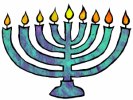
[ The eight-day Festival of Chanukah begins Saturday, Dec. 8th at sundown this year... ]
12.06.12 (Kislev 22, 5773) The Hebrew word chanukah (חֲנֻכָּה) means "dedication" and marks an eight day winter celebration that commemorates the victory of faith over the ways of speculative reason, and demonstrates the power of the miracle in the face of mere humanism. Although it is customarily observed as a "Festival of Lights," Chanukah is essentially a "fighting holiday," that is, a call to resist the oppression of this world and to exercise faith in the LORD. This year Chanukah runs from Saturday, Dec. 8th (at sundown, i.e., Kislev 25) and runs through Sunday, December 16th (i.e., Tevet 2).
As I've mentioned before, the word chanukah shares the same root as the Hebrew the word chinukh (חִנּוּךְ), meaning "education." Just as the Maccabees fought and died for the sake of Torah truth, so we must wage war within ourselves and break the stronghold of apathy and indifference that the present world system engenders. We must take time to educate ourselves by studying the Torah and New Testament, for by so doing we will be rededicated to the service of the truth and enabled to resist assimilation into the corrupt world. "Love not the world, neither the things that are in the world..." (1 John 2:15). The "cleansing of the Temple" is a matter of the heart, chaverim. The enemy is apathy and the unbelief it induces. We are called to "fight the good fight of faith" and not to conform to this present age with its seductions and compromises (1 Tim. 6:12, Rom. 12:2).
Free Chanukah Blessing Cards
Besides baking some Chanukah cookies (עוּגִיּוֹת), dusting off your recipe for latkes, cleaning your menorahs, finding your dreidels, and decorating your "Chanukah Bush," you might want to review the Hebrew blessings customarily recited during this season... The Chanukah Blessings page includes free "Hebrew Study Cards" you can use to help you study. Each card includes the Hebrew text, phonetic transliteration, and English translation for the blessing. In addition, I have recorded Hebrew audio clips for the Chanukah blessings as well, so you can listen to the Hebrew as your learn to recite the blessings...
To make it easier to remember the blessings during the candle lighting celebration, I have created a handy one page summary you can download here. I hope you find this material helpful, chaverim! Chag Chanukah Sameach (חַג חֲנֻכָּה שָׂמֵחַ)!
 |
Judah and Josiah made some Chanukah cookies
A Great Miracle Happened...
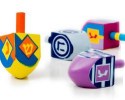
[ The eight-day Festival of Chanukah begins Saturday, Dec. 8th at sundown this year... ]
12.06.12 (Kislev 22, 5773) Each side of a dreidel (a four-sided spinning top used for Chanukah) has a different letter of the Hebrew alphabet: Nun (נ), Gimmel (ג), Hey (ה), and Shin (שׁ), which together form the acronym, Nes Gadol Hayah Sham (נֵס גָדוֹל הָיָה שָׁם) – "a great miracle happened there," referring to the victory of the Macabees. In Israel, however, the letter Shin is replaced with the letter Pey (פּ) to form the acronym, Nes Gadol Hayah Poh (נֵס גָדוֹל הָיָה פּה), meaning "a great miracle happened here," referring to Temple and the land of Israel. Because Chanukah represents Yeshua, the true Light of the World, we likewise can say: Nes Gadol Hayah Poh, "a great miracle happened here," referring to the Temple of our hearts, when the Light of the LORD overcame our darkness and gave us everlasting hope and consolation...
Thank God that after Yeshua was crucified and died for our transgressions, the parochet in the Temple (i.e, the veil separating the Holy of Holies from the rest of the Temple) was torn from top to bottom, thereby opening the way of access to the Divine Presence for all who are willing to come in faith... The light of God's love now shines for us all!
 |
Yeshua is the Light...

[ The eight-day Festival of Chanukah begins Saturday, Dec. 8th at sundown this year... I wrote the following last year, but think it's worth reading again just before the holiday begins. ]
12.06.12 (Kislev 22, 5773) In the Gospel of John it is recorded that Yeshua said, "I am the way, the truth, and the life" (John 14:6). The Greek word translated "truth" in this verse is aletheia (ἀλήθεια), a compound formed from an alpha prefix (α-) meaning "not," and lethei (λήθη), meaning "forgetfulness." Truth is therefore a kind of "remembering" of something forgotten; a recollecting of what is essentially real. Etymologically, the word aletheia suggests that truth is also "unforgettable" (i.e., not lethei), that is, it has its own irresistible "witness" to reality. People may lie to themselves, but ultimately the truth has the final word. "The light shines in the darkness, and the darkness has not overcome it" (John 1:5).
Greek scholars have noted that the word lethei itself is derived from the verb lanthano (λανθάνω), which means "to be hidden," so the general idea is that a-letheia (i.e., truth) is non-concealment, non-hiddenness, or (put positively) revelation or evident disclosure. Thus the word of Yeshua - His message, logos (λόγος), revelation, and presence - is both "unforgettable" and irrepressible. Yeshua is the Unforgettable One that has been manifest as the express Word of God (דְּבַר הָאֱלהִים). Yeshua is the Light of the world (אוֹר הָעוֹלָם) and the one who gives us the "light of life" (John 8:12). Though God's message can be supressed by evil and darkened thinking, the truth is regarded as self-evident and full of intuitive validation (see Rom. 1:18-21).
The Hebrew word for truth (i.e., emet: אֱמֶת) comes from a verb (aman) that means to "support" or "make firm." There are a number of derived nouns that connote the sense of reliability or assurance (e.g., pillars of support). The noun emunah (i.e, אֱמוּנָה, "faithfulness" or "trustworthiness") comes from this root, as does the word for the "faithful ones" (אֱמוּנִים) who are "established" in God's way (Psalm 12:1). A play on words regarding truth occurs in the prophet Isaiah: אִם לא תַאֲמִינוּ כִּי לא תֵאָמֵנוּ / im lo ta'aminu, ki lo tei'amenu: "If you are not firm in faith, you will not be firm at all" (Isa. 7:9; see Faith Establishes the Sign). Without trust in the LORD, there is no stability... Truth is something trustworthy, reliable, firm, or sure. In colloquial English, for example, this idea is conveyed when we say, "He's a true friend...", indicating that the loyalty and love of the person is certain. The familiar word "amen" likewise comes from this root. Speaking the truth (dibbur emet) is considered foundational to moral life: "Speak the truth (דַּבְּרוּ אֱמֶת) to one another; render true and perfect justice in your gates" (Zech. 8:16). Yeshua repeatedly said, "Amen, Amen I say to you...." throughout his teaching ministry to stress the reliability of God's truth (Matt. 5:18, 26, etc.). Indeed, Yeshua is called "the Amen, the faithful and true witness" (Rev. 3:14).
The relationship between the Hebrew and the Greek ideas seems to be that the revelation of God - the aletheia - is reliable and strong. The source for all truth is found in the Person and character of the LORD God of Israel, blessed be He... The self-disclosure of the LORD is both unforgettable - both in the factual and moral sense - as well as entirely trustworthy. Aletheia implies that truth is something that should never be forgotten. Hence we are regularly commanded and encouraged not to "forget" the LORD (Deut. 8:11, Psalm 103:2, etc.), to "remember" his covenants, to "keep" his ways, to "guard" His precepts, and so on.
So, do you have ohr ha-chayim (אוֹר הַחַיִּים), "the light of Life," shining within your heart? For this Chanukah season - and always - may we find courage and remember what is written: "The LORD is my light and my salvation (i.e., my Yeshua); whom shall I fear? The LORD is the refuge of my life; of whom shall I be afraid?"
יְהוָה אוֹרִי וְיִשְׁעִי מִמִּי אִירָא
יְהוָה מָעוֹז־חַיַּי מִמִּי אֶפְחָד
Adonai · o·ri · ve·yish·i · mi·mi · i·ra?
Adonai · ma·oz · chai·yai · mi·mi · ef·chad?

"The LORD is my light and my salvation (i.e., my Yeshua), whom shall I fear?
The LORD is the refuge of my life, of whom shall I be afraid?"
(Psalm 27:1)

Download Study Card
Tamar and the Messiah
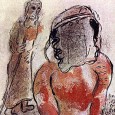
[ The following is related to this week's Torah reading, Parashat Vayeshev. Please read the Torah portion to "find your place" here. ]
12.06.12 (Kislev 22, 5773) This week's Torah portion includes the rather unseemly account of Judah's union with his Canaanite daughter-in-law, Tamar (תָּמָר). Various Jewish commentators wondered why this narrative was inserted into the midst of the story of Joseph and his brothers. After all, the continuity of the Joseph story is clearly seen by simply skipping over chapter 38, so the question naturally arises as to why the story of Judah and Tamar was parenthetically placed here in the Torah. According to the Malbim, the story of Judah represents the axiom that "God creates the cure before the plague." Since the sale of Joseph led to the Egyptian exile (which is considered the paradigm of all exiles), it was necessary to plant the roots of ultimate redemption before the exile began. Thus before the "new Pharaoh" was born who would enslave Israel, the line of the Messiah, Israel's Redeemer, was further determined.
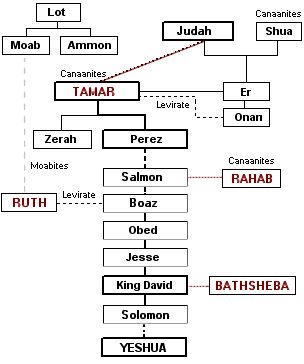 |
Note: For more on this subject, see the article "Judah and Tamar."
Crossing Over to Life...

12.05.12 (Kislev 21, 5773) Most of our deepest anxieties come from the fear of death, whether we are conscious of this or not... For many people, death represents fear of the unknown, fear of being abandoned, fear of being rejected, fear of being separated from others, and so on. I am so grateful that Yeshua gives us eternal life, which for me is not so much about immortality of the soul as it is being loved and accepted by God... Because God loves and accepts me, I trust Him to always be present for me, even in the darkest hours, on the other side of the veil, having "prepared a place for me." As Yeshua said, "I tell you the solemn truth, the one who hears my message and believes the One who sent me has (now, today, this hour) eternal life (חַיֵּי עוֹלָם) and will not be condemned, but has already passed (i.e., μετά + βαίνω, lit., "crossed over" [עָבַר]) from death to life" (John 5:24).
Still, today we are given the "light of life" (John 8:12). Some people seem so obsessed with the idea of life after death that they forget that right now, today, this very hour, they have eternal life. They want life after death but they should want life before death too!
כִּי הֶהָרִים יָמוּשׁוּ וְהַגְּבָעוֹת תְּמוּטֶנָה
וְחַסְדִּי מֵאִתֵּךְ לא־יָמוּשׁ
וּבְרִית שְׁלוֹמִי לא תָמוּט
אָמַר מְרַחֲמֵךְ יְהוָה
ki · he·ha·rim · ya·mu·shu · ve·ha·ge·va·ot · te·mu·te·nah
ve·chas·di · me·it·tekh · lo · ya·mush
u·ve·rit · she·lo·mi · lo · ta·mut
a·mar · me·rach·a·mekh · Adonai

"For the mountains may depart and the hills be removed,
but my love shall not depart from you,
and my covenant of peace shall not be removed,"
says the LORD, who has mercy on you.
(Isa. 54:10)

Download Study Card
The Name of the LORD means God is Present and God is love... As I've noted before, the Hebrew word for love (i.e., ahavah: אהבה) equals the number thirteen (1+5+2+5=13), but when shared it is multiplied: 13 x 2 = 26, the same value for the Sacred Name (יהוה), i.e., (10+5+6+5=26). Likewise the Hebrew word for "life" is chayim (חַיִּים), is written in the plural to emphasize that life cannot be lived alone but must be shared. Notice that within the word chayim itself are embedded two consecutive Yods (יי), representing unity in plurality (Yod-Yod is an abbreviation for YHVH indicating the "deep Akedah" of Father and Son). God gave up His life so that we can be in relationship with Him, that is, so that we can be "at-one" with His heart for us. Whatever else it may mean, the cross represents God's love for you, and if you miss that, you've missed the entire point.
Note: The Hebrew word for "joy" or "happiness" is simchah (שִׂמְחָה), which can be read as "that which is" (שׁ) "wiped away" (מָחָה), a phrase that suggests the joy we will have when God one day wipes away our tears (Isa. 25:8). Likewise, we can experience simchah in our lives as we let go of the pain of the past, forgiving others, and refusing to be aggrieved...
 |
The Wonder of Faith...
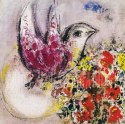
12.05.12 (Kislev 21, 5773) Both the skeptic and the dogmatist are closed-minded people. The skeptic believes it is futile to ask "the big questions" of life since he believes there are no real answers, whereas the dogmatist believes it is likewise futile to ask because he already has all the answers. Both approaches lack real imagination and are wonderless... A person of honest faith, on the other hand, questions, wrestles, wonders, seeks, desires, hungers and thirsts for truth, even though he realizes that there are many things he will never fully understand or know. And yet he presses on....
וְיִבְטְחוּ בְךָ יוֹדְעֵי שְׁמֶךָ
כִּי לא־עָזַבְתָּ דרְשֶׁיךָ יְהוָה
ve·yiv·te·chu · ve·kha · yo·de·ei · she·me·kha
ki · lo · a·zav·ta · do·re·she·kha · Adonai

"And those who know your name put their trust in you,
for you, O LORD, have not forsaken those who seek you."
(Psalm 9:10)

Chanukah and Humanism...
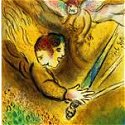
[ The eight-day Festival of Chanukah begins Saturday, Dec. 8th at sundown this year... ]
12.05.12 (Kislev 21, 5773) The holiday of Chanukah reminds us that we must remain committed to Torah truth in a godless, and therefore insane, world. After all, since reality is the "handiwork" (i.e., conscious design) of an all-powerful, all-knowing, all-loving, morally perfect, purposive, personal, and spiritual Agency who has been revealed in the Jewish Scriptures, those who deny this reality are living in a state of ongoing delusion. In a sense, the history of humanity - especially as it has been expressed philosophically and politically -- has been nothing less than the conscious design to redefine reality as something that it isn't. "The kings of the earth station themselves, and the dignitaries take counsel together against the LORD and His Messiah" (Psalm 2:1-3). Spiritual warfare is therefore the fight for sanity and truth in a world that prefers madness and self-deception.
In a prophetic sense the story of "Epihpanes" foreshadows the coming time of the "Messiah of Evil" (antichrist) who will one day attempt to "assimilate" all of humanity into a "New World Order" (Dan. 9:27, 2 Thess. 2:3; Rev. 13:7-9, etc.). At first he will appear to be a "world savior" who will broker peace for Israel and the Mideast, but after awhile, like his archetype Epiphanes, he will savagely betray the Jewish people and set up a "desolating sacrilege" in the Holy Place of the Temple (Matt. 24:15). His satanic rise will occur during acharit hayamim - the "End of Days" - otherwise called the period of the Great Tribulation (Matt. 24). The Final Victory of God will be established when Yeshua returns to destroy this Messiah of Evil at His Second Coming. The Holy Temple will then be rebuilt and dedicated by the hand of the true Mashiach of Israel.
The Gemara says that Javan, the descendant of Noah's son Japheth (Gen. 10:2), became the founding father of ancient Greece who inherited Japheth's blessing: "May God give beauty to Japheth (יַפְתְּ אֱלהִים לְיֶפֶת) and let him dwell in the tents of Shem" (Gen. 9:27). This blessing gave him the special ability to found the arts, philosophy, and science, though if these were exercised apart from the influence of Shem, that is, apart from a Torah perspective, such pursuits would ultimately become vain and even dangerous. In other words, even though "all truth is God's truth," human learning must be contextualized in light of the divine revelation. The humanistic mindset deifies knowledge and technique; it understands to believe, instead of believing to understand. For this reason, among others, the spiritual war between Zion and the secular world rages to this hour...
Note: For more on this, please see "Chanukah and Spiritual Warfare."
 |
Affliction and Comfort...

12.05.12 (Kislev 21, 5773) Some of us carry a deep and stubborn inner pain that refuses to leave us, even after we have poured out our hearts before heaven for deliverance... Perhaps this pain comes from wounds inflicted early in life that left us feeling betrayed, victimized, wary of the promise love. God knows the struggle. We can find healing when we learn to "own" the pain and make it part of our story, trusting that God will use it in our lives to draw us to him for our good. After all, God is called "the Father of Mercies and God of all comfort" (אַב הָרַחֲמִים וֵאלהֵי כָּל־נֶחָמָה), and the Lord "comforts us" (lit., "calls us to His side," παρακαλέω) in our afflictions so that we may be able to comfort those who are afflicted with the same comfort with which we ourselves are comforted by God (2 Cor. 1:3-4).
הָרפֵא לִשְׁבוּרֵי לֵב וּמְחַבֵּשׁ לְעַצְּבוֹתָם
מוֹנֶה מִסְפָּר לַכּוֹכָבִים לְכֻלָּם שֵׁמוֹת יִקְרָא
ha-ro·fei · lish·vu·rei · lev · u'me·cha·besh · le'atz·tze·vo·tam
mo·neh · mis·par · la·ko·kha·vim · le·khu·lam · she·mot · yik·ra

"He is the healer of the brokenhearted and the One who binds up their sorrows.
He counts the number of the stars, to all of them He assigns names."
(Psalm 147:3-4)

Download Study Card
The Inner Light of Faith...
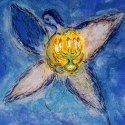
[ The eight-day Festival of Chanukah begins Saturday, Dec. 8th at sundown this year... ]
12.04.12 (Kislev 20, 5773) Allow the light of God's love to shine in you brightly. As Yeshua said, "Whoever has my commandments and keeps them, such is the one who loves me. And the one who loves me will be loved by my Father, and I will love him and will manifest myself to him" (John 14:21). Note that the Greek word for "manifest" means to "shine inside" (i.e., ἐμφανίζω, from ἐν, "in" and φαίνω, "shine"), indicating that the revelation would be inward light of the Divine Presence. The Hebrew word for "praise" (i.e., tehillah: תְּהִלָּה) comes from a verb that means "to shine" (i.e., halal: הָלַל), from which we derive the word "halo." Similarly, the word "aura" comes from the Hebrew word "ohr" (אוֹר), meaning "light." Let your inner light shine before others so that they may see your good works and give honor to your Father who is in heaven" (Matt. 5:16).
אֱלהִים יְחָנֵּנוּ וִיבָרְכֵנוּ
יָאֵר פָּנָיו אִתָּנוּ סֶלָה
E·lo·him · ye·chon·nei·nu · vi·var·khei·nu
ya·er · pa·nav · it·ta·nu · se·lah

"May God be gracious to us and bless us
and make his face to shine upon us, selah."
(Psalm 67:1)

True spirituality is inner light that comes from union with God. "God is light, and in him is no darkness at all." We "walk in the light," experiencing inner peace and joy in the Holy Spirit when we heed and obey the Voice of God's love and abide in the secret place of His Love. The people of God are united to one another by the power of God's love. O LORD God, "light up my eyes lest I sleep the sleep of death" (Psalm 13:3). May the light and love of our God shine within you, chaverim!
Bound to the Heart...
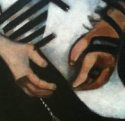
12.04.12 (Kislev 20, 5773) "You shall therefore lay up these words of mine in your heart and in your soul, and you shall bind them as a sign on your hand, and they shall be as frontlets between your eyes. You shall teach them to your children, talking of them when you are sitting in your house, and when you are walking by the way, and when you lie down, and when you rise" (Deut. 11:18-19).
A Yiddish proverb says, "A half-truth is a whole lie." Truth is not a matter of personal preference; it is not based on majority rule, popularity, expediency, or wishful thinking. Truth is another word for reality, and reality is inherently self-authenticating and ultimately irresistible. You may be able to fool yourself at times, but secretly the soul detests the charade. A "divided kingdom will not stand," just as a double-minded person is unstable in all his ways (James 1:8). "Let your ear hear what your mouth utters." Words are used to heal, not to hurt; they are meant to edify, not to tear down (Eph. 4:29). "The mouth of the righteous utters wisdom, and his tongue speaks justice. The teaching of his God is in his heart; his feet do not slip" (Psalm 37:30-31).
Of course, since truth ultimately is grounded in the will of a Person, namely, the Creator and LORD of all, it is intensely personal, morally meaningful, aesthetically beautiful, manifestly volitional, essentially loving and benevolent, incandescently holy, transcendentally righteous, irreducibly spiritual, and so on. Yeshua is the Beginning, the Center, and the End of all truth in the universe; He is "the way, the truth, and the life" (John 14:6). The light of His countenance radiantly shines from behind all superficial and transitory appearances.
 |
Turn Dark Places to Light...
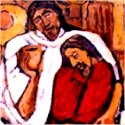
12.04.12 (Kislev 20, 5773) Recall that Yeshua said, "If the Son shall set you free, you shall be free indeed" (John 8:36). De Mello tells this story. A fearful believer was asked why he was so anxious about his faith. "Lest I fail to attain God's salvation," he replied. "But what is God's salvation? What does this mean to you?" "Personal liberation, deliverance, freedom," came the reply. "So you are forced to be free? You are bound to be liberated?" At that moment, the anxious believer relaxed and lost his fear forever.
Some people are afraid to be set free, and therefore they imagine that God's "unconditional love" is not so unconditional after all... They get anxious and begin looking to themselves once again. They believe that their religious performance is what really matters, so they busy themselves with sanctimonious humbug and get uptight over various rituals and religious observances (Col. 2:20-22). Because they have yet to truly let go and trust God to meet their deepest needs, their wear themselves out by imagining that God's glorious grace is somehow insufficient, that something more is expected of them, and so on. This fear is a great snare, and we must be vigilant to guard ourselves from its allure: "What the Messiah has freed us for is freedom! Therefore, stand firm, and don't let yourselves be tied up again to a yoke of slavery" (Gal. 5:1). Where there is the Spirit of the LORD (רוּחַ הָאָדוֹן), there is freedom, and indeed, the Hebrew word for salvation (i.e., yeshuah: יְשׁוּעָה) means to "make wide" in the sense of being set free or delivered from what restricts, limits, confines, or holds us back. Salvation marks a transition from bondage to freedom.
The cognitive side of believing - faith or emunah - is necessary but insufficient for finding inner peace with God. Focusing on the cognitive when the need is spiritual is a category mistake, like using the wrong tool for the job, so to speak... The deeper problem is that we need a heart change, a powerful transformation of the inner life. This is a matter of bittachon, or trust, as we receive the unconditional love of God into our inner life. Doing so sets us free from anxiety because we "let go" and trust that God will take care of us...
Do you have trouble receiving this message as your own? Henri Nouwen keenly wrote: "There are two realities to which you must cling. First, God has promised that you will receive the love you have been searching for, and second, God is faithful to that promise." You must believe the "yes" that comes back when you ask, "Do you love me?" You must choose this "yes" even when you do not experience it" (Inner Voice of Love).
O LORD God, I have no good apart from You; turn my dark places to light, according to your sacred promise: "I will lead the blind in a way that they do not know, in paths that they have not known I will guide them. I will make dark places before them turn to light, and perverse things into uprightness. These things I will do, and I will not forsake them."
וְהוֹלַכְתִּי עִוְרִים בְּדֶרֶךְ לא יָדָעוּ
בִּנְתִיבוֹת לא־יָדְעוּ אַדְרִיכֵם
אָשִׂים מַחְשָׁךְ לִפְנֵיהֶם לָאוֹר
וּמַעֲקַשִּׁים לְמִישׁוֹר
אֵלֶּה הַדְּבָרִים עֲשִׂיתִם וְלא עֲזַבְתִּים
ve·ho·lakh·ti · iv·rim · be·de·rekh · lo · ya·da·u
bin·ti·vot · lo · ya·du · ad·ri·khem
a·sim · mach·shakh · lif·ne·hem · la·or
u·ma·a·ka·shim · le·mi·shor
el·lah · ha·de·va·rim · a·si·tim · ve·lo · a·zav·tim

"And I will lead the blind in a way that they do not know,
in paths that they have not known I will guide them.
I will make dark places before them turn to light,
and perverse things into uprightness.
These things I will do, and I will not forsake them."
(Isa. 42:16)

Hebrew Study Card
Note that the Hebrew word ma'akashim (מַעֲקַשִּׁים), often translated as "crooked," comes from a root word (עִקֵּשׁ) meaning "perverse" or "twisted," and therefore most accurately describes the inner twisting caused by iniquity and sin... Yeshua is our Good Shepherd (הָרעֶה הַטּוֹב) who drives away the inner darkness, heals us of our perversity, and leads us into the land of God's righteousness.... Blessed is His Name forever.
Trust in the Silence...
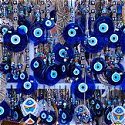
12.04.12 (Kislev 20, 5773) "I believe. I believe in the sun even when it is not shining; I believe in love even when feeling it not; and I believe in God, even when God is silent" (from an anonymous poem found on the wall of a cellar in Cologne, Germany, where some Jews hid from the Nazis).
קוּמִי רנִּי בַלַּיְלָה לְראשׁ אַשְׁמֻרוֹת
שִׁפְכִי כַמַּיִם לִבֵּךְ נכַח פְּנֵי אֲדנָי
שְׂאִי אֵלָיו כַּפַּיִךְ עַל־נֶפֶשׁ עוֹלָלַיִךְ
ku·mi · ro·ni · va·lai·lah · le·rosh · ash·mu·rot
shif·khi · kha·ma·yim · lib·bekh · no·khach · pe·nei · a·do·nai
se·i · e·lav · ka·pa·yikh · al · ne·fesh · o·la·lai·yikh

"Arise, cry out in the night, at the beginning of the night watches!
Pour out your heart like water before the face of the LORD!
Lift your hands to him for the lives of your children."
(Lam. 2:19)

Joseph as a picture of Messiah
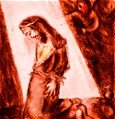
[ The following is related to this week's Torah reading, Parashat Vayeshev. Please read the Torah portion to "find your place" here. ]
12.03.12 (Kislev 19, 5773) More chapters of Torah are devoted to the life of Joseph than to the account of creation, the story of Adam and Eve, the flood of Noah, the call of Abram to the promised land, the miraculous birth and (near) sacrifice of Isaac, the transformation of Jacob into Israel, and so on. Joseph is given such prominence in Scripture because his life depicted both the Suffering Servant (Yeshua's first advent) and the One who reigns at the right hand of the power on high and delivers Israel (Yeshua's second advent). The life of Joseph provides a "prophetic outline" of Yeshua the Messiah.
Jewish tradition sometimes refers to two redeemers, each being called "Messiah" (i.e., Mashiach: מָשִׁיחַ). Both of these redeemers are involved in delivering the Jewish people from galut (exile) and ushering in the long-awaited Messianic era. These two Messiahs are called Mashiach ben David (מָשִׁיחַ בֶּן־דָוִד), "the Messiah the descendant of David," and Mashiach ben Yosef (מָשִׁיחַ בֶּן־יוֹסֵף), "the Messiah the descendant of Joseph," respectively.
When Jews typically think of "the" Messiah (i.e., ha-mashiach: הַמָּשִׁיחַ), however, they generally have in mind Mashiach ben David of the tribe of Judah who shall rule in the Messianic age. Mashiach ben Yosef is said to be of the tribe of Ephraim (son of Joseph), and is also sometimes called Mashiach ben Ephraim (Bavli Sukah 52b). Mashiach ben Yosef will come first, before the advent of Mashiach ben David, to prepare the world for the coming of the kingdom of the LORD. He will fight God's wars (against "Edom," collectively understood as the enemies of Israel) in a time preceding the fulfillment of the Messianic Kingdom (this is sometimes referred to as Ikvot Mashiach, the "footsteps of the Messiah").
The Rabbis derive this understanding of Mashiach ben Yosef from their exegesis of Obadiah 1:18: "The house of Jacob shall be a fire, and the house of Joseph a flame, and the house of Esau stubble; they shall burn them and consume them, and there shall be no survivor for the house of Esau, for the LORD has spoken." Moreover, they understand the confrontation between the "house" of Joseph and the "house" of Esau to be prefigured in the birth of Joseph himself, where Rachel indicated that God would "add a son" (i.e., ben acher: בֵּן אַחֵר) who would be anointed for battle in the End of Days (midrash on Gen. 30:24).
Note: For more on this subject, including 60 ways in which Joseph prefigured the advent of Yeshua the Messiah, see "Mashiach ben Yosef."
 |
Light in Our Darkness...
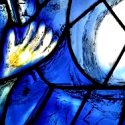
[ The eight-day Festival of Chanukah begins Saturday, Dec. 8th at sundown this year... ]
12.03.12 (Kislev 19, 5773) Chanukah is ultimately about giving, since it marks the season that God chose to give His Son to the world as our Savior (via the incarnation). Yeshua is indeed "the Light of the World," the true light that enlightens every person who is born (John 1:9). As the Source of all light, His power is irrepressible, invincible, and overcomes every shade of darkness. Yeshua is the Logos (Λόγος), the underlying reason that sustains all of creation. Unlike the motions of the heavenly bodies, the Divine Light remains constant and supreme over all of creation, without the slightest trace of diminution or variation... And just as we know that the Sun is still shining even on the cloudiest of days, so we understand that the Divine Presence is always there -- always giving, always shining, always loving us... God's radiance and truth will forever pervade the darkness to enlighten our way. As Yeshua said, "I have come into the world as light, so that whoever believes in me may not remain in darkness" (John 12:46).
זָרַח בַּחשֶׁךְ אוֹר לַיְשָׁרִים
חַנּוּן וְרַחוּם וְצַדִּיק
za·rach · ba·cho·shekh · ohr · lai·sha·rim
chan·nun · ve·ra·chum · ve·tzad·dik

"Light dawns in the darkness for the upright;
He is gracious, merciful, and righteous" (Psalm 112:4)

Hebrew Study Card
I believe that God's love is greater than the darkness of my many sins, my shame, my pain, and my many fears... In the darkness I have found the LORD, blessed be He, to indeed be wonderfully gracious, merciful, and righteous.
Note: For more on this, see "Should Christians Celebrate Chanukah?"
Parashat Vayeshev - וישב

[ The following is related to this week's Torah reading, Parashat Vayeshev. Please read the Torah portion to "find your place" here. ]
12.02.12 (Kislev 18, 5773) From the beginning of this week's Torah portion (Vayeshev) until the end of Sefer Bereshit (the Book of Genesis), the focus shifts from the patriarch Jacob to his twelve sons, and particularly to his beloved son Joseph (יוֹסֵף). Recall that Joseph's jealous brothers had stripped him of his "coat of many colors" and then mercilessly threw him into a pit -- a providential event that eventually led to the deliverance of the Jewish people by the hand of a "disguised savior." Indeed, story of Joseph's ordeal is a story of divine hashgachah (providential supervision) that foretells the glory of Yeshua our Messiah, both as the Suffering Servant and as a national deliverer of Israel.
The Torah reading begins, "Jacob settled (vayeshev Ya'akov) in the land of his father's sojourning, in the land of Canaan" (Gen. 37:1), but then immediately turns to the story of Joseph, who was seventeen years old at the time: "And these were the generations of Jacob: Joseph being seventeen years old..." (Gen. 37:2). Why does the toldot (genealogy) of Jacob begin with Joseph rather than Reuben (the firstborn son of Leah) here? Was the Torah suggesting that Joseph was regarded by Jacob as his (chosen) "firstborn" son?
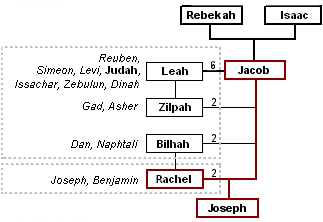 |
Jacob and Joseph undoubtedly shared a lot in common, and this surely caused Jacob to prefer his firstborn son (of Rachel) over his other sons. For instance, both men had infertile mothers who had difficulty in childbirth; both mothers bore two sons; and both were hated by their brothers. In addition, the Torah states that Jacob loved Joseph more than all his other sons since he was the son of his old age, and was the firstborn son (bechor) of his beloved wife Rachel. Indeed, Jacob made him an ornamented tunic (ketonet passim) to indicate his special status in the family.
At any rate, the Talmud (Sanhedrin 106a) notes that whenever the word vayeshev (וַיֵּשֶׁב) is mentioned in Torah, it introduces a painful episode. Immediately following the statement that "Jacob settled (vayeshev Ya'akov) in the land of his father's sojourning," the Torah states that Joseph brought an "evil report" about his brothers to his father. This act ultimately led to the selling of Joseph into slavery and to further heartache for Israel. The Jewish sage Rashi notes that whenever someone called by God wants to "settle down" and live at ease, God orchestrates events to keep him free from complacency. This certainly happened in the case of Jacob, where sibling rivalry and baseless hatred (called sinat chinam: שִׂנְאַת חִנָּם) so disrupted the peace of the family that his children were eventually led into exile and slavery.
But there is redemption and healing, even in the midst of betray and loss... We note that Joseph was sent by his father from the "depth of Hebron" (מֵעֵמֶק חֶבְרוֹן) to seek the welfare of his brothers (Gen. 37:14). Hebron (חֶבְרוֹן) is one of the very first places Abraham lived after he entered the Promised Land (Gen. 13:18). The word itself comes from a root (ח.ב.ר) that means "union," or "friendship," suggesting that from the depth of family union would come struggle but eventual deliverance. The "depths of Hebron" therefore suggests that Joseph's assignment was ultimately redemptive in nature - to restore love to the family by means of God's providential salvation...
Note: This year the eight-day Festival of Chanukah begins Saturday, December 8th at sundown (1st candle) and runs through Sunday, December 16th.
 |
|










































































